Professor Alemka Markotic to be Crowned Zagreb Woman of the Year
February the 28th, 2021 - The name Professor Alemka Markotic would likely have only been known to patients at Zagreb's ''Dr. Fran Mihaljevic'' Clinic for Infectious Diseases were it not for the coronavirus pandemic. Now that name has become a household one, and she is about to be crowned Zagreb woman of the year.
Alemka Markotic, the director of the aforementioned Zagreb clinic, went from total anonymity to being a public figure in a very short amount of time following the novel coronavirus' arrival in Croatia, and it hasn't always been easy for her to cope with. Now about to be crowned Zagreb woman of the year, it seems the toil has been worth it.
As Poslovni Dnevnik writes, Professor Alemka Markotic, the soon to be Zagreb woman of the year, will be handed the award by the City of Zagreb. The Croatian capital hands out this award each and every year, this year there were twelve candidates, among others was Natalija Prica, a young MP who is regularly seen in the company of late Zagreb Mayor Milan Bandic, 24sata reports.
The session of the parliamentary Committee for Public Recognitions will be held on Monday, and then Professor Markotic will be officially voted as Zagreb woman of the year following her efforts in fighting the coronavirus pandemic and dedicating her every waking moment to that cause throughout pandemic-dominated 2020.
The result of course still needs to be confirmed by the Assembly, but it was confirmed by several interlocutors, HDZ and the late Milan Bandic, who all hold power in Zagreb in partnership, that they had all agreed on the winner being Alemka Markotic.
In addition to the recognition as Zagreb woman of the year, this award also brings 50,000 kuna to Dr Alemka Markotic's pocket.
For the latest travel info, bookmark our main travel info article, which is updated daily.
Read the Croatian Travel Update in your language - now available in 24 languages.
European Investment Bank Group Invests 530 Million Euros in Croatia
February the 28th, 2021 - The European Investment Bank Group enjoyed a record year in Croatia last year despite the economic woes caused by the pandemic, the unstable situation and the restrictive epidemiological measures introduced.
As Marina Klepo/Novac writes, the European Investment Bank Group had a decent 2020, securing 530 million euros in loans, equity and guarantees. The European Investment Bank invested a massive 342.5 million euros, and the European Investment Fund, the second component of the group, invested 187.9 million euros.
''Responding to the economic crisis caused by the ongoing coronavirus pandemic, small and medium-sized Croatian enterprises have been provided with key financial support to preserve jobs and boost the Croatian economy,'' said Dario Scannapieco, the EIB's vice president in charge of business in Croatia,.
"Together with our partners, we've opened up new sources of financing and helped launch the first venture capital funds in Croatia. These activities have modernised Croatian financial markets and increased the ability of domestic financial institutions to stimulate economic recovery and development,'' added Scannapieco, presenting the results of the European Investment Bank Group in Croatia.
He added that the EIB was "looking forward" to further co-operation with the Croatian Government, as well as with the Croatian private and public sectors, in order to seize the multibillion-euro investment opportunities stemming from the EU-wide coronavirus pandemic recovery programme with the simultaneous implementation of initiatives and action programmes in the field of a sustainable and circular economy.
"We must make sure that Croatia benefits from these projects as much as possible, and that it recovers and continues with its sustainable economic and social development," Scannapieco said.
In response to the ongoing pandemic, the group said the EIB set aside approximately 180 million euros for Croatia last year, and that the group is still working with its partners in the country to repurpose and expand existing loans to SMEs and other companies to support the most affected businesses and enterprises.
"In partnership with Croatian financial institutions, new deals are being considered to make new sources of funds available to SMEs and medium-sized companies from key sectors of the Croatian economy," they said from the European Investment Bank Group. Minister of Finance Zdravko Maric recalled that 2020 was a very challenging year for the economy, and that the government, together with European Union and other international partners, reacted with a sense of urgency.
"The European Investment Bank Group has made a significant contribution to responding to the economic consequences of the COVID-19 pandemic in Croatia. By supporting SMEs and other enteprises through domestic financial intermediaries, the EIB has helped to meet current liquidity needs in a time of difficulty that hasn't been experienced in a long time. In addition to emergency support, assistance has been immediately provided for ongoing investment projects to enable their continuation,'' Maric explained.
As increased uncertainty will continue in the coming period, he expressed satisfaction that the European Investment Bank Group is helping to recover as well as meet long-term investment needs. He believes that the EU bank "will play an important role in overcoming future challenges in Croatia."
Within six deals contracted in 2020 to support domestic SMEs, EIB loans reached a massive 342.5 million euros, and more than 70 percent of that amount, or 245.5 million euros, was secured in cooperation with HBOR. The remaining 97 million euros was placed with Croatian commercial banks through domestic companies. Thanks to these activities, since the beginning of operations in Croatia, the total investments of the EIB have reached a huge 7.06 billion euros.
For the latest travel info, bookmark our main travel info article, which is updated daily.
Read the Croatian Travel Update in your language - now available in 24 languages.
Spaladium Arena Prepared as Mass Vaccination Site in Split
February 28, 2021 - Preparations are coming to an end at the Spaladium Arena, soon opening as a mass vaccination site in Split.
"Since last Monday, members of the Split-Dalmatia County Red Cross have been working on setting up the Spaladium Arena so that when larger quantities of vaccines arrive, it can be ready to welcome the start of large-scale vaccination. We have arranged 20 cubicles in which people will be vaccinated, which are needed to have a little privacy when getting vaccinated. As far as we are concerned, everything will be prepared by the end of this week at the latest," said Joško Metličić, the new director of the Split-Dalmatia County Red Cross, for Slobodna Dalmacija.
Only those who have been scheduled for vaccination will be able to come to the Spaladium Arena.
"At a specific hour, a certain number of people will be scheduled, who will be called and released to the Arena, where they will sit in prepared places and wait their turn for vaccination. Those who, say, are scheduled at 11 am will not be vaccinated at 9 if they come to the vaccination site two hours earlier. So, the order will have to be respected according to the list and according to the schedule," says Metličić.
Željka Karin, director of the Institute of Public Health of the Split-Dalmatia County, said we could start with large-scale vaccination as early as next week.
"We still don't know how much and which vaccine we will get next week. We received about six thousand doses of PfizerBiontech and AstraZeneca vaccines this week, and Moderna did not come, although it was announced. We distributed all the obtained vaccines to family doctors and special duty points, where people are also vaccinated. How many people have been vaccinated with those six thousand doses so far? We don't know yet. However, I think that next week we should not receive less than six thousand doses," says Dr. Karin.
Interest in vaccination is high.
"People are calling; they want to get vaccinated. If we had sufficient quantities of vaccines, we in Split-Dalmatia County would quickly vaccinate the population. We would have a satisfactory number of vaccinated by June this year at the latest. But for now, unfortunately, the vaccine is not in sufficient quantities. Next week we could put Spaladium Arena into operation to see if everything will work well and so that we can, if there are any shortcomings, fix those shortcomings so that it is ready for the real mass vaccination, which I expect in mid-March," explains Dr. Karin.
The number of cases in Split-Dalmatia County started to grow, connected with several events where groups of people were noticed (family celebrations, socializing in apartments).
"In the last two days, we have a slight decline, and I want to believe that there will continue to be a decline in the number of new infections. But when the terraces of catering facilities open, if the numbers start to go wild again, they will need to think about a possible closure again because it won’t make sense. I believe that it is in everyone's interest to have a tourist season, and I believe that it is in the interest of all private individuals who have restaurants and cafes to work over the summer. Therefore, I ask everyone and call on everyone to take responsibility and to respect all epidemiological measures, so that they would not be surprised and so that sometime in April they would not be forced to close catering facilities again," concluded Željka Karin.
To read more about COVID-19 in Croatia, follow TCN's dedicated page.
PHOTOS: Prefab Housing Project for Earthquake-Damaged Homes in Banija
February 28, 2021 - A housing project to replace the severely earthquake-damaged homes in Banija, made by experts from the Faculty of Architecture in Zagreb, has been completed.
Jutarnji List reports that about twenty types and sixty subtypes of typical modular prefabricated houses are ready for execution in the earthquake-affected area.
Namely, the Ministry of Physical Planning, Construction, and State Property is preparing a tender for contractors to replace the houses in Sisak-Moslavina and Karlovac counties. Several companies that produce typical houses or elements have shown interest in this venture at an enviable technological level. With the desire to improve such products in terms of space and design and comply with demanding regulations, teachers of the Faculty of Architecture in a short time designed a series of projects of typical modular prefabricated houses that have been merged into an ambitious publication, “Post-earthquake reconstruction for typical houses,” which should be printed in early March.
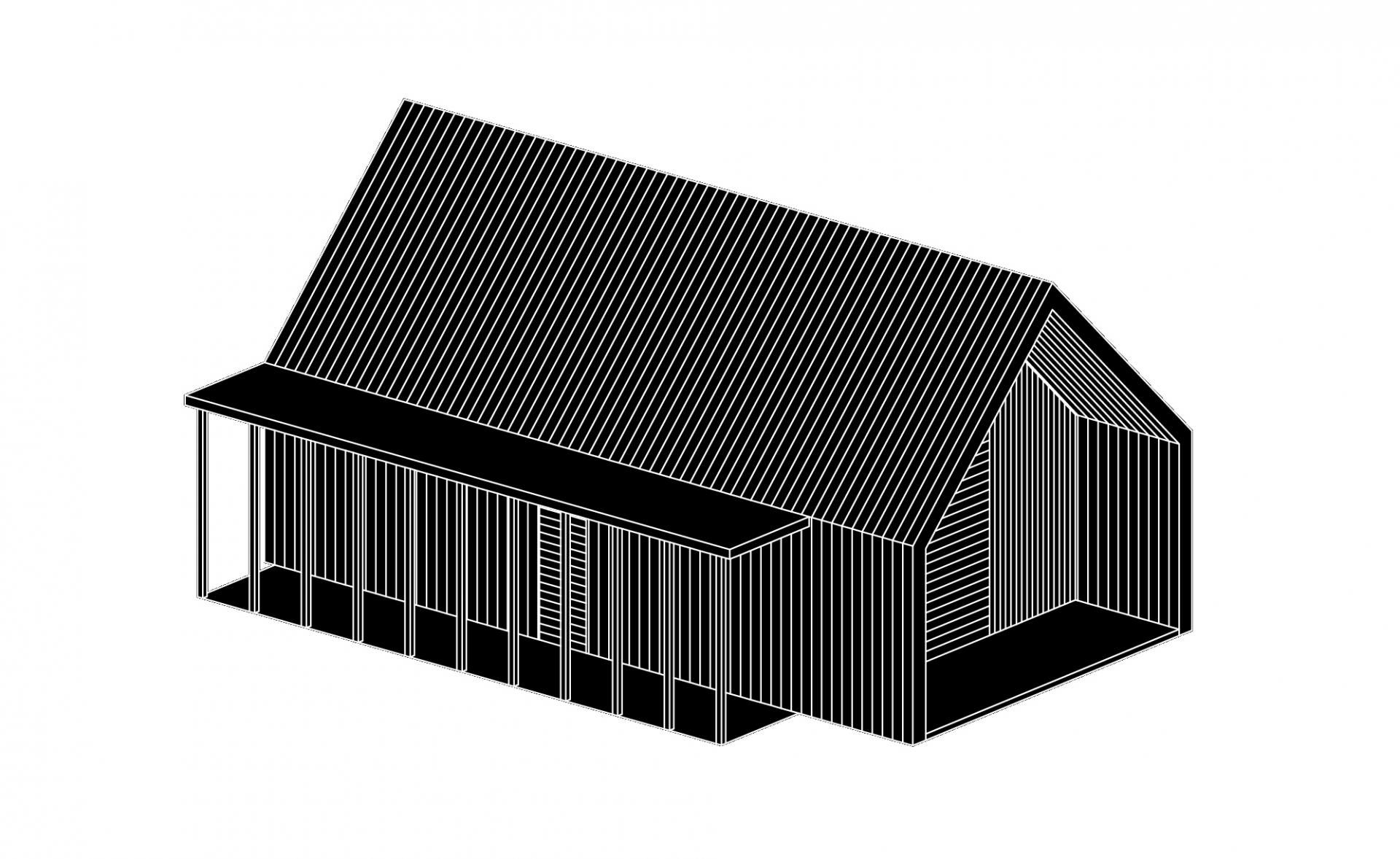
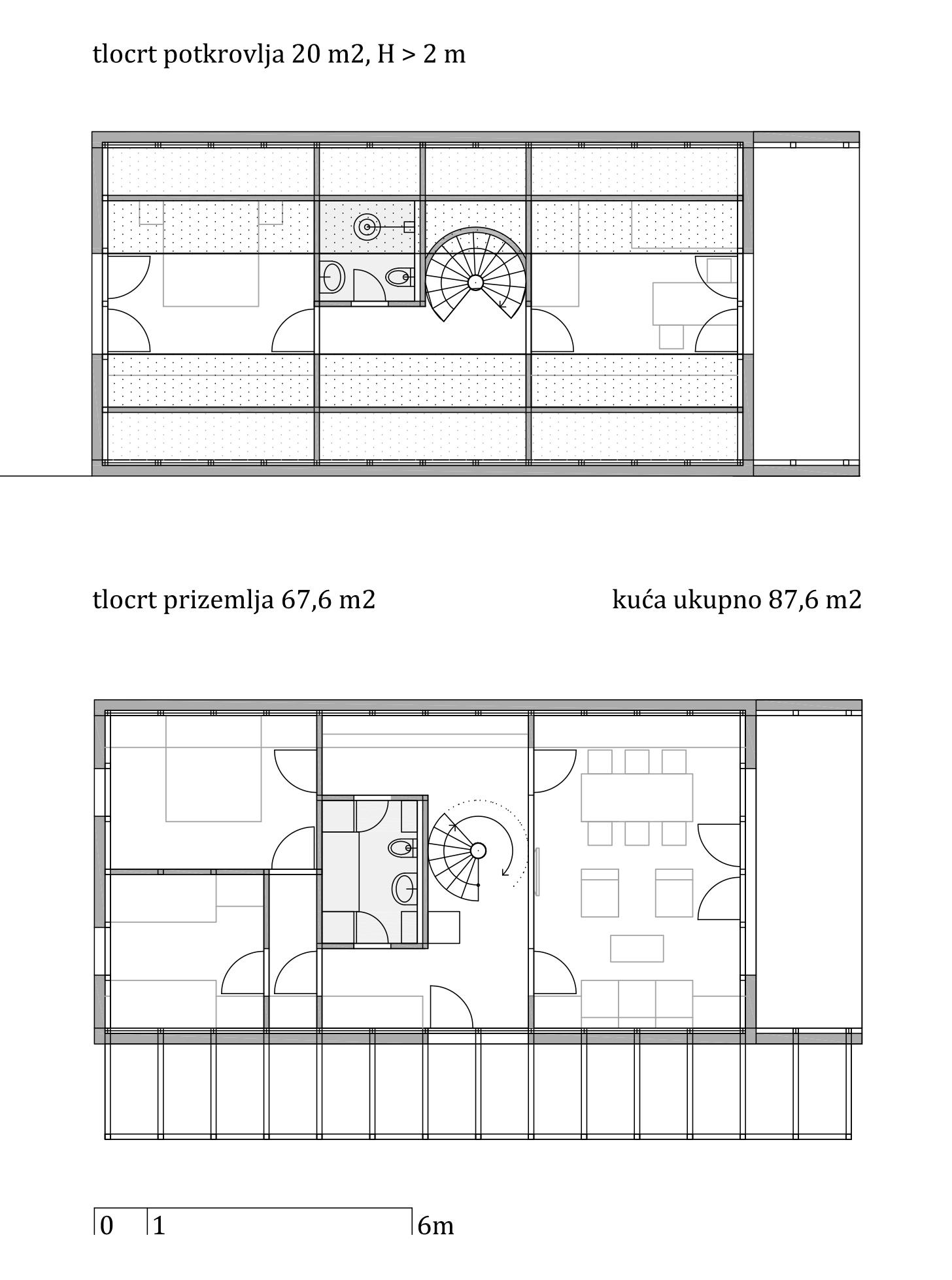
Mladen Josic, Minja Josic
Typical modular house with the possibility of expanding into the attic space (spatial view and floor plans)
Prof. Mladen Jošić is one of the leading designers of (multi) housing construction in the Republic of Croatia and the author of norms (dimensional standards) that should be used to design standard solutions for Banija. The project includes the possibility of expanding into the attic and optional additional elements (front and side porch)
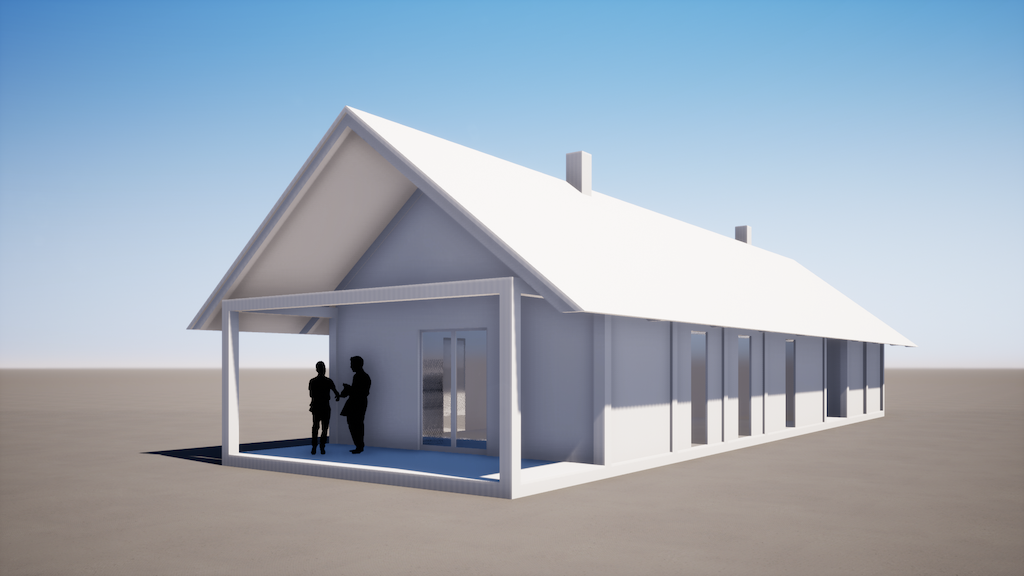
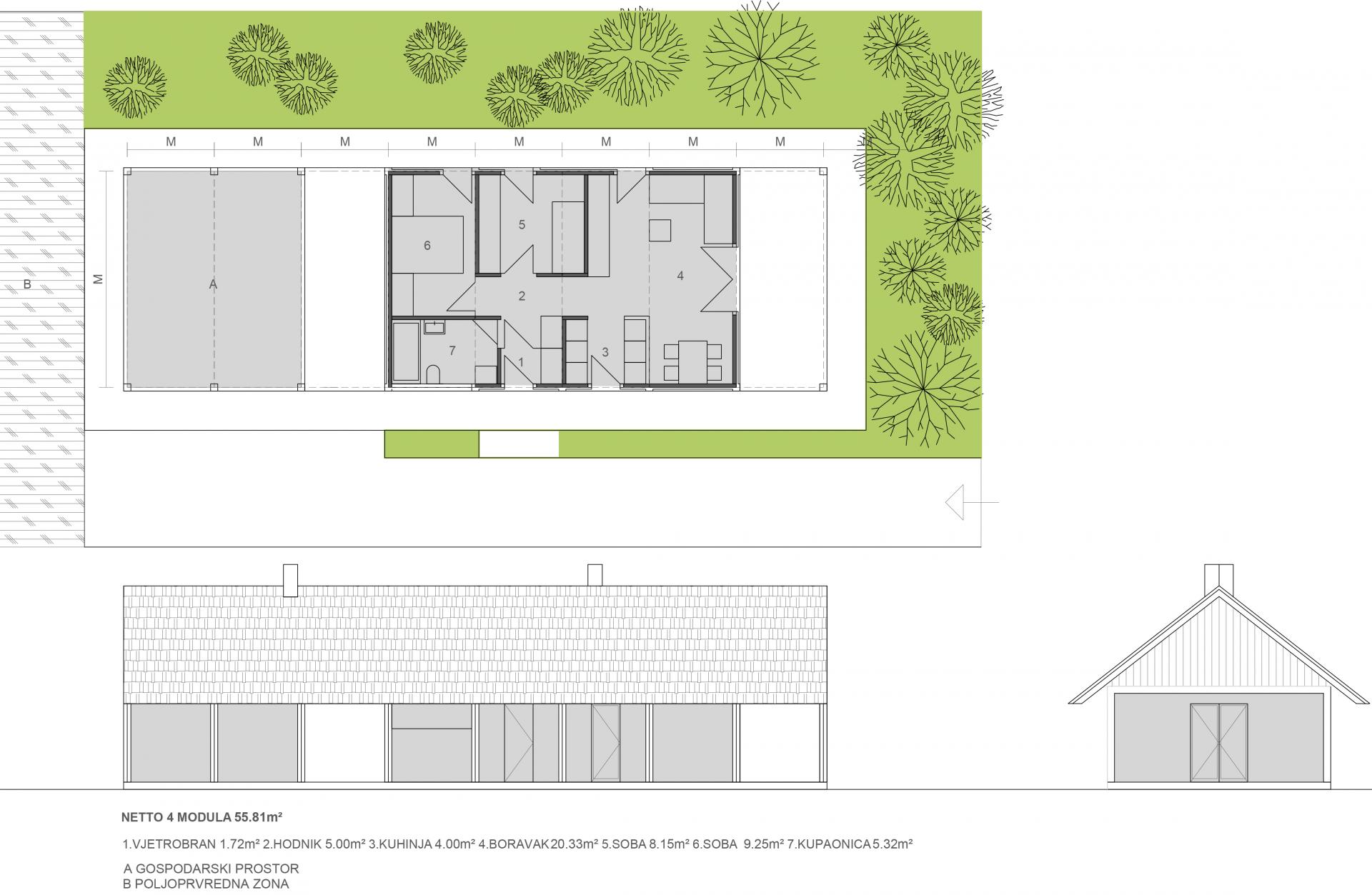
Vedran Duplančić
A typical modular house is based on a container module - spatial view and floor plan + facades.
Vedran Duplančić is a professor at the Department of Architectural Structures and Building Physics. His project - which is created in the module of one type of container - seeks to implement economic facilities under one roof, in addition to housing: tool storage, tractor parking, etc.
Since the fatal earthquake on December 29, 2020, which hit the area of Sisak-Moslavina County and a series of subsequent shakes that are still ongoing, the Zagreb Faculty of Architecture has been active in structured involvement to help the hardest-hit areas.
"Aware of the lack of time and speed with which to solve problems in the field, we decided to propose the production of different types of family houses with a special focus on light, semi-prefabricated and prefabricated houses made of lightweight materials. At the same time, in all types of houses, the proposed light construction can be replaced by classic and monolithic brick and concrete construction, without changing the floor plan and design," said dean Bojan Baletić.
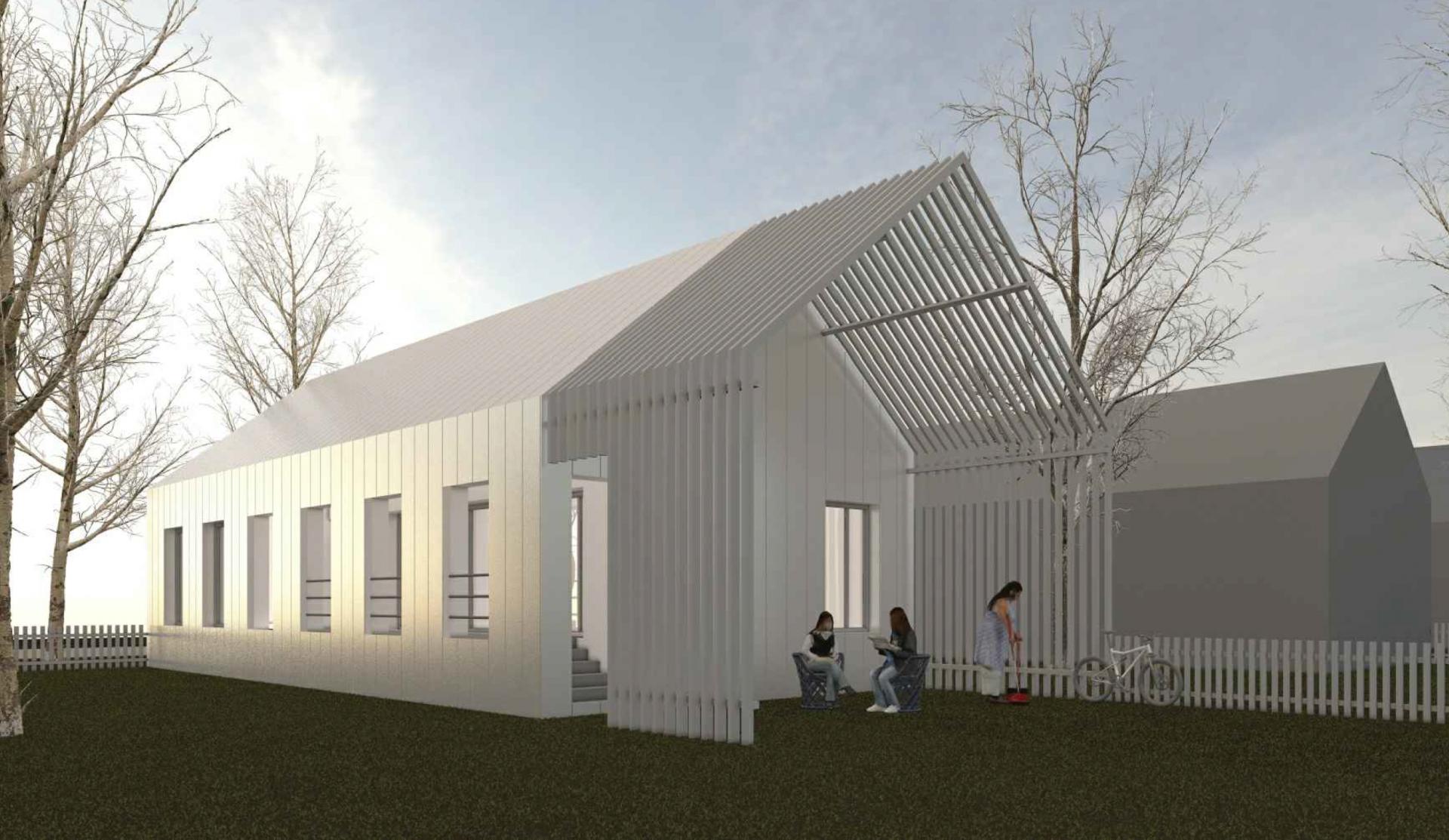
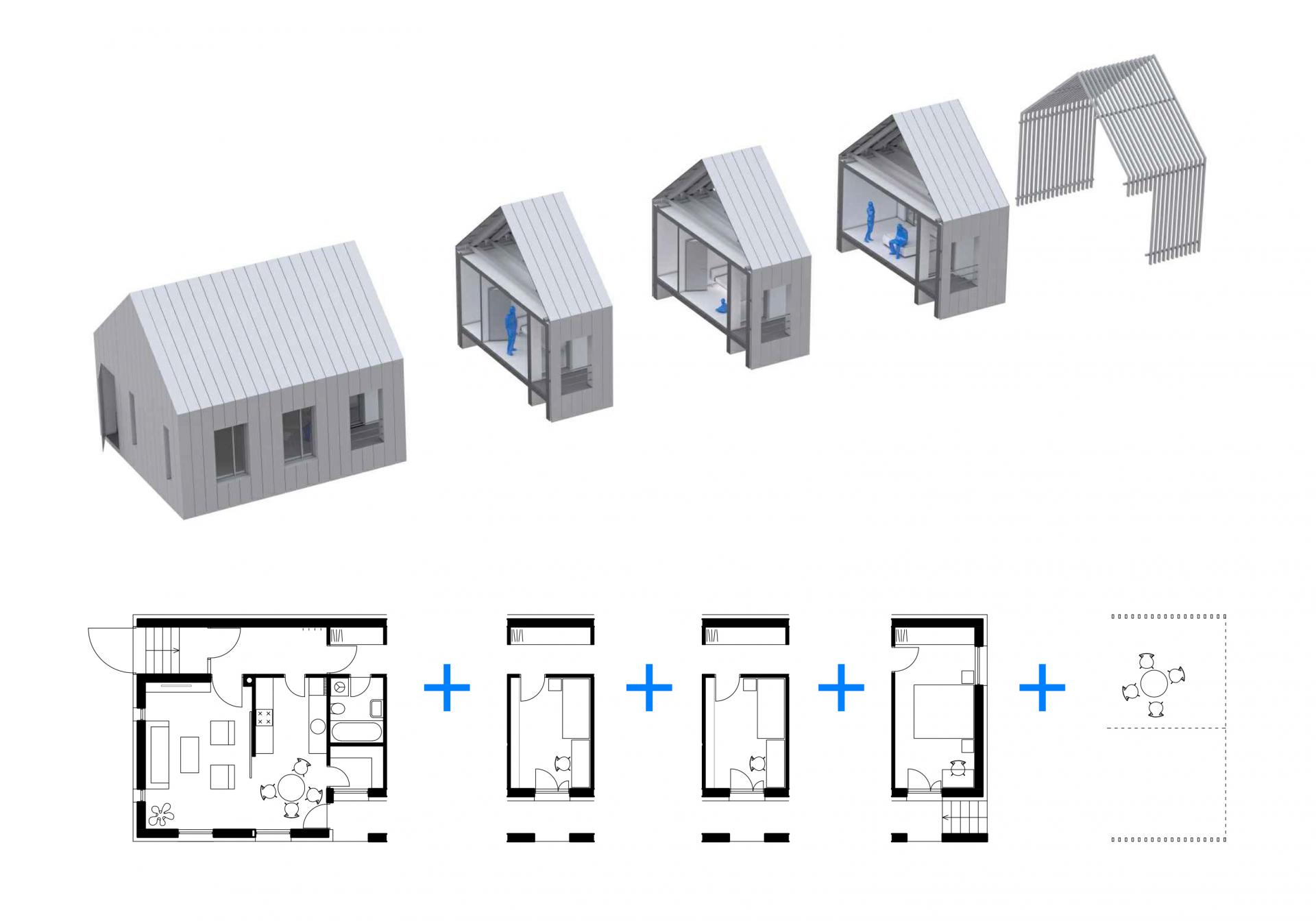
Luka Korlaet, Nino Virag
Typical modular house with a barn - simulation and scheme of modular growth
Luka Korlaet and Nino Virag are teachers of the Cabinet for Residential Buildings of the Department of Architectural Design, where they continuously study new types of housing organizations. This house connects with the environment, i.e., the plot's economic part.
The characteristics of the resulting examples, he adds, are evident in the modular design and construction, the variability of the dynamic floor plan, and the recognizability of the volume.
"All offered types of houses are designed for workshop-factory production in parts and assembly on construction sites. All projects use wooden, metal, or combined construction. They can be performed on light foundations - piles or foundation slabs. They meet the requirements of the nZEB in a rational and practically enforceable manner. They use renewable energy sources. They represent dry and fast construction," Baletić points out.
About twenty teachers were engaged in the development of project solutions. All the proposed houses consider the features of traditional architecture, but not in the banal sense of repetition of form, but in terms of creative interpretation of the local way of life. The teachers/designers were very well acquainted with the history of architecture of this area because they were described by experts Aleksandar Freudenreich, Davor Salopek, and Jasenka Kranjčević.
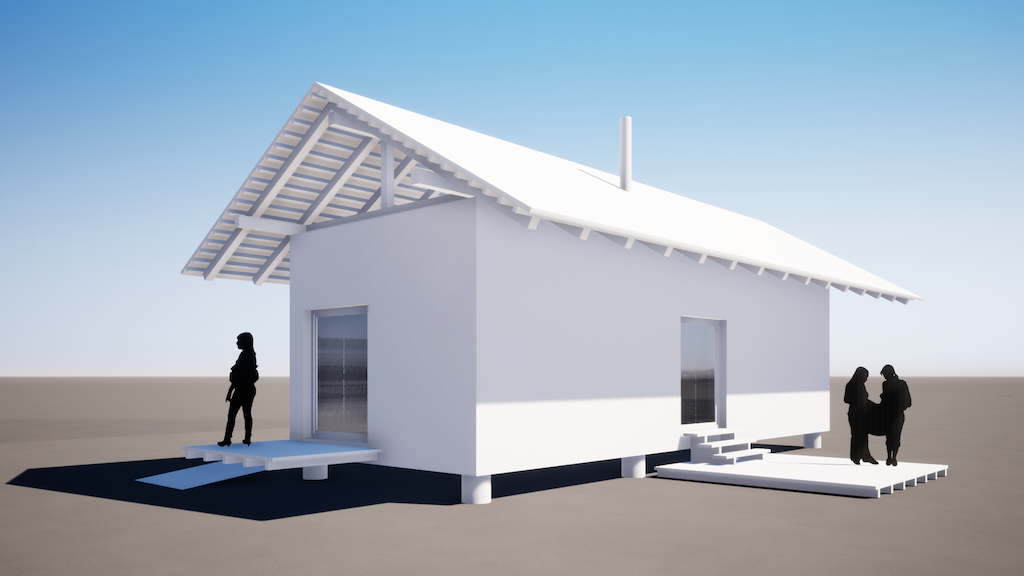
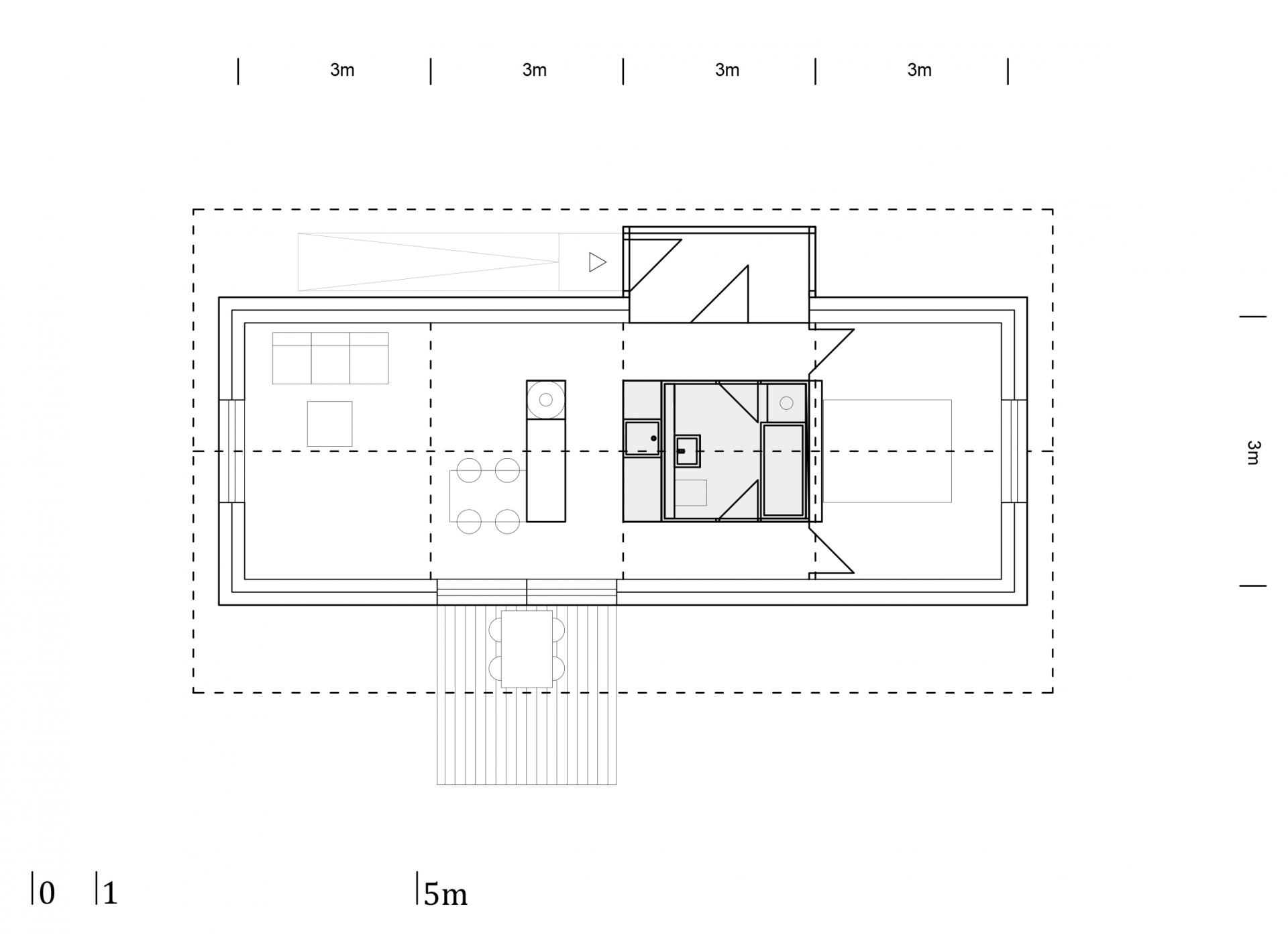
Lea Pelivan + Studio UP
Typical modular prefabricated house of 50 m2 - view and floor plan
Lea Pelivan is a professor in the Cabinet for Residential Buildings of the Department of Architectural Design and a partner in the project bureau Studio UP. In practice and teaching, she works in typological research, i.e., finding answers to the question of how architecture should / could respond to the spirit of the times.
The publication aims to position the profession (architects) in the place it deserves, i.e., to point out the necessity of quality and functional organization of space and adequate design. Furthermore, the intention is for architects to recognize themselves as unavoidable participants in the reconstruction. It is impossible to imagine or carry out the reconstruction of earthquake-devastated spaces. The criteria for selecting designers and contractors and the allocation of replacement facilities have yet to be determined by the competent Ministry. In this process, the Faculty of Architecture and the Croatian Chamber of Architects are partners and advisors in design and construction.
"The Faculty intends to conclude cooperation agreements with potential contractors. We have already established contact with several companies, and their representatives realize that they would be more competitive with better architectural solutions," says assistant professor Luka Korlaet, executive editor of the publication. Public procurement for the construction of typical replacement houses will be evaluated according to the price, deadlines, and, they hope, the proposed architectural solutions' quality.
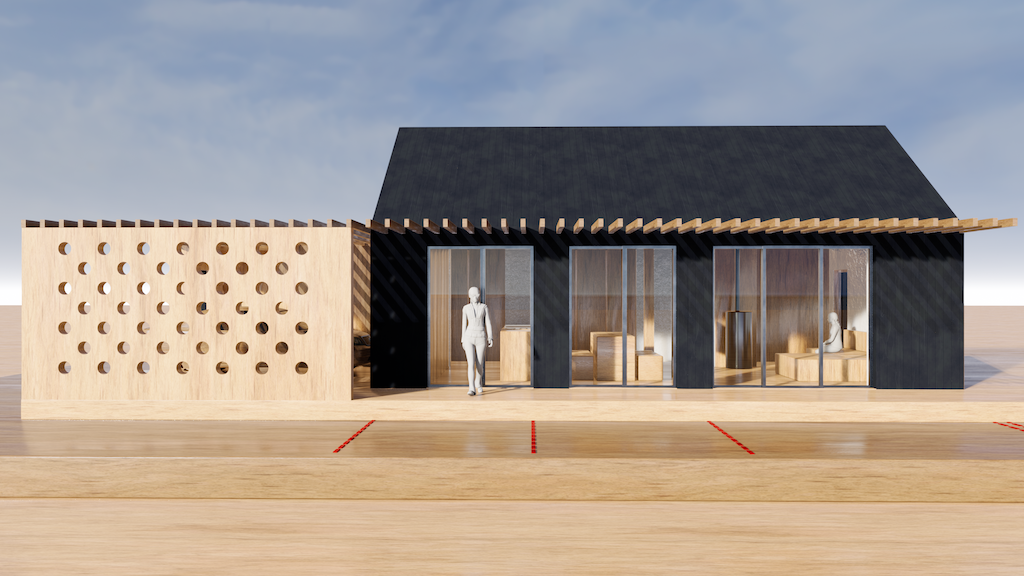
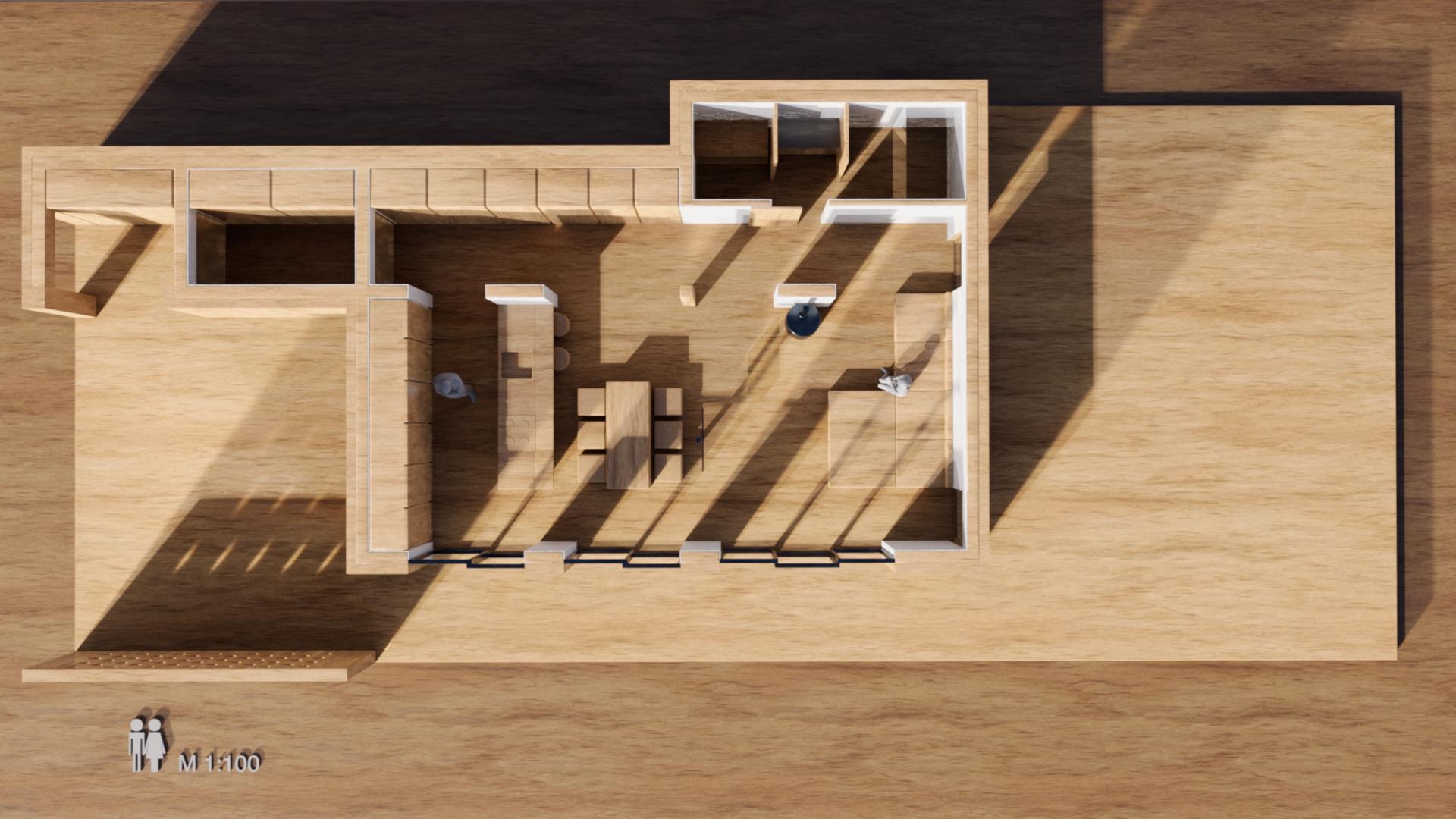
Alenka Delić
Typical modular house - exterior view and floor plan/layout
Alenka Delić is a professor at the Cabinet for Residential Buildings of the Department of Architectural Design, where she continuously works with typical, modular houses. The project in the picture is created in collaboration with a contractor and is a great example of synergy.
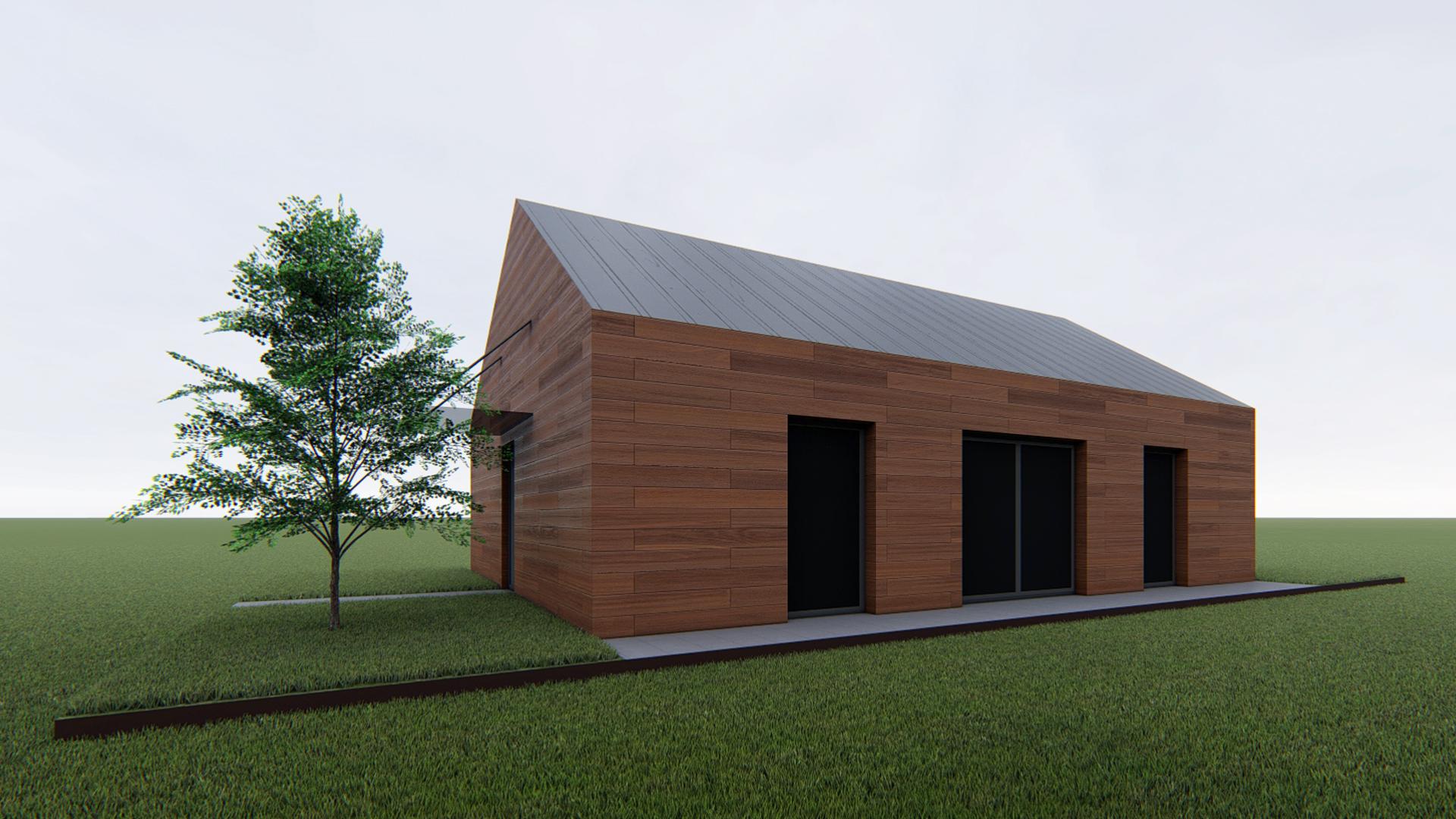
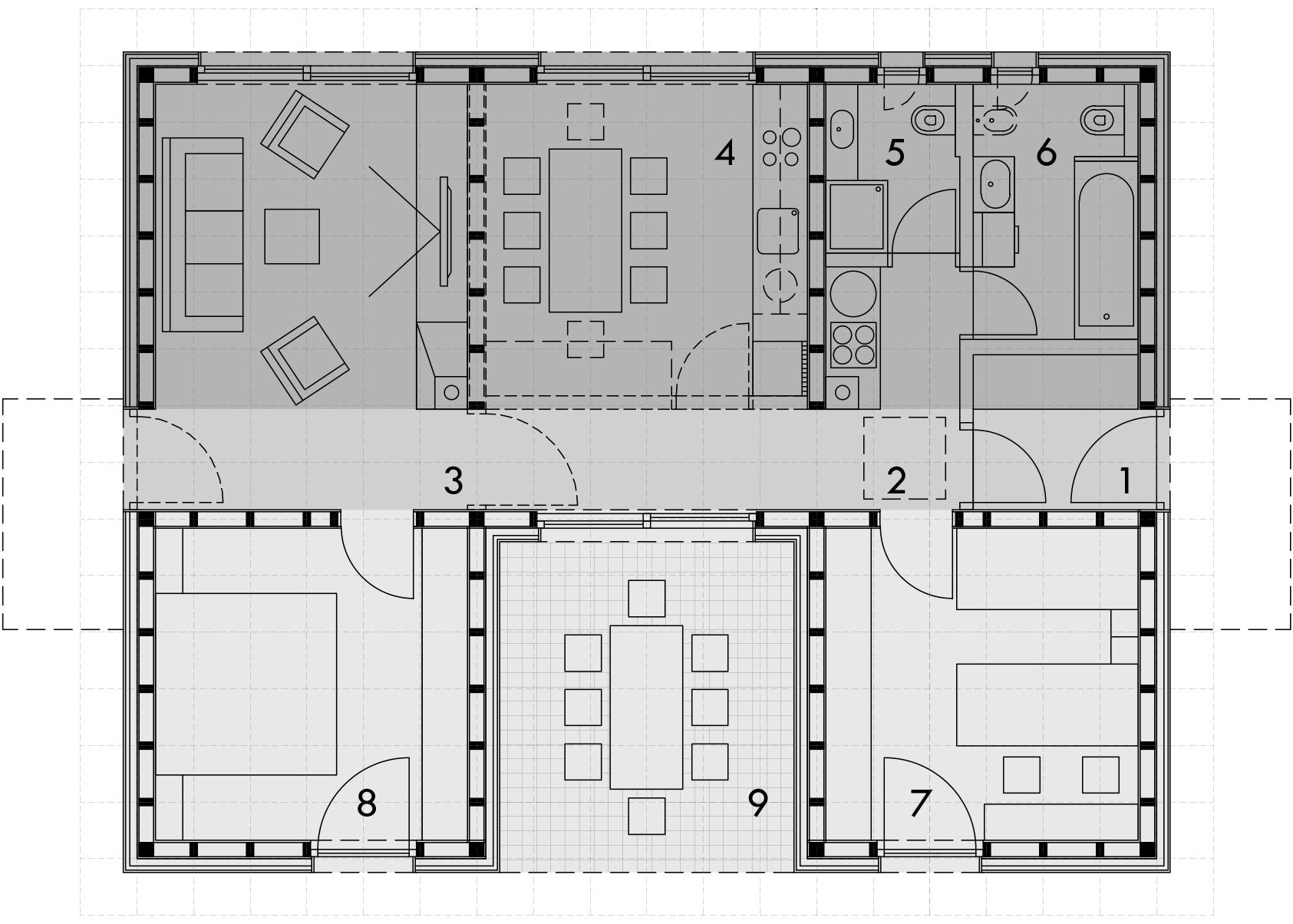
Ljubomir Miscevic, Mark Miscevic
Typical modular house in PGS system - simulation and floor plan
Prof. Ljubomir Miščević is the doyen of prefabricated modular construction in the Republic of Croatia, who patented several systems and products (PGS, EcoSandwich, among others). He has chaired the Passive House Croatia Consortium for years. He developed this system in collaboration with his son Mark, also an architect.
"Our faculty staff is an attempt to control the quality of the future built space as much as we can," Korlaet points out. We also discuss several proposed projects and variations. The range of solutions of about twenty of them guarantees that the reconstruction will not be uniform: there are 3500 severely damaged houses, and it would not be good to replace them all with two or three types/subtypes.
The companies that will compete have different technological starting points and will choose the types that suit them. The Faculty of Architecture solutions are similar but again different and creatively interpret local housing models. A special category of renovation consists of outbuildings, which should be in focus because all the residents of Banija emphasize the importance of accompanying economic activities, i.e., care for poultry and livestock.
"The entire public, and especially us as experts, were disturbed by images not only of demolished old brick houses, mostly from the 19th century, but also scenes of several relatively new buildings that collapsed. This indicates improvised or illegal construction, as well as the bad consequences of the legalization of inadequately built facilities," says Professor Karin Šerman.
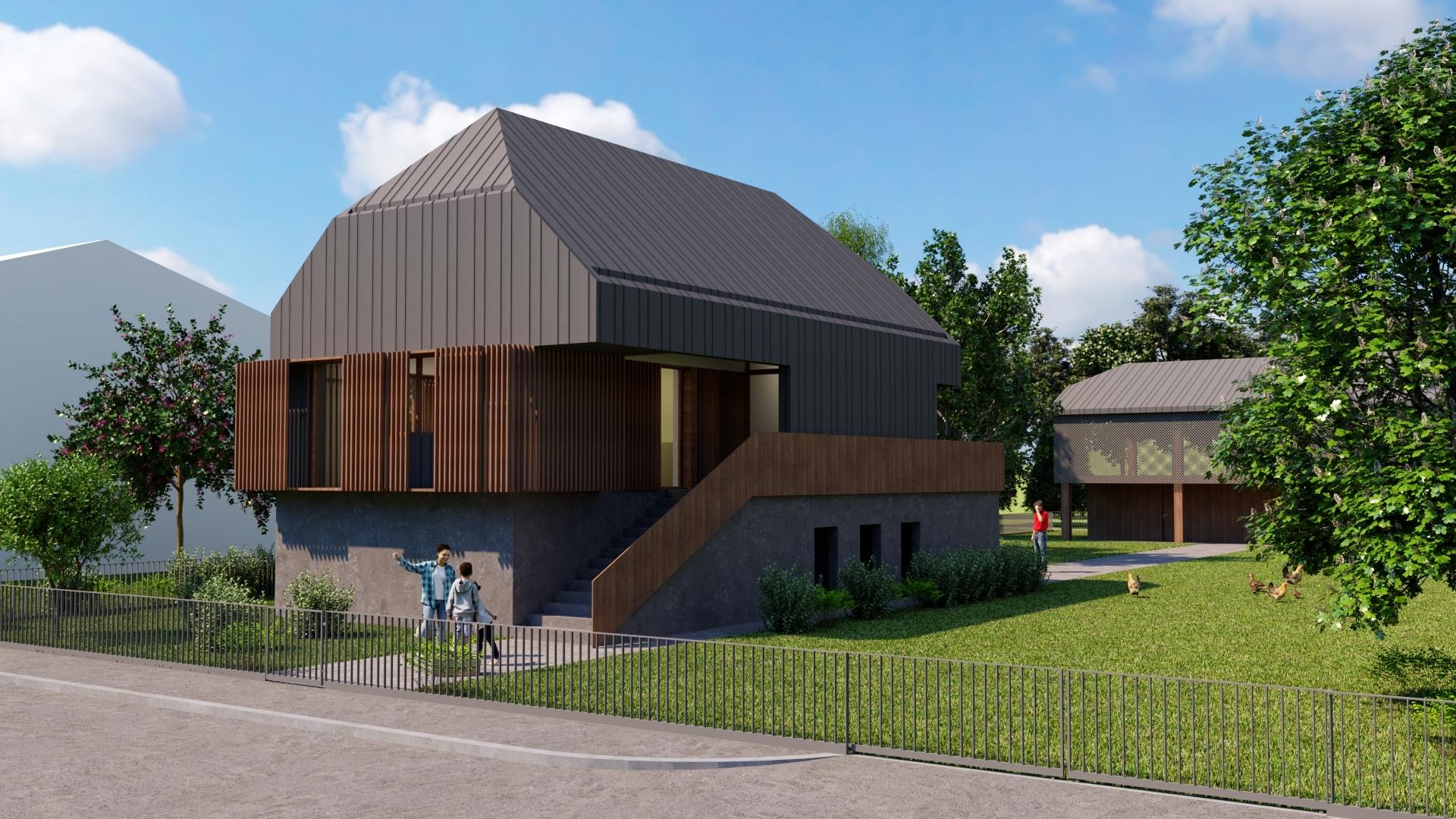
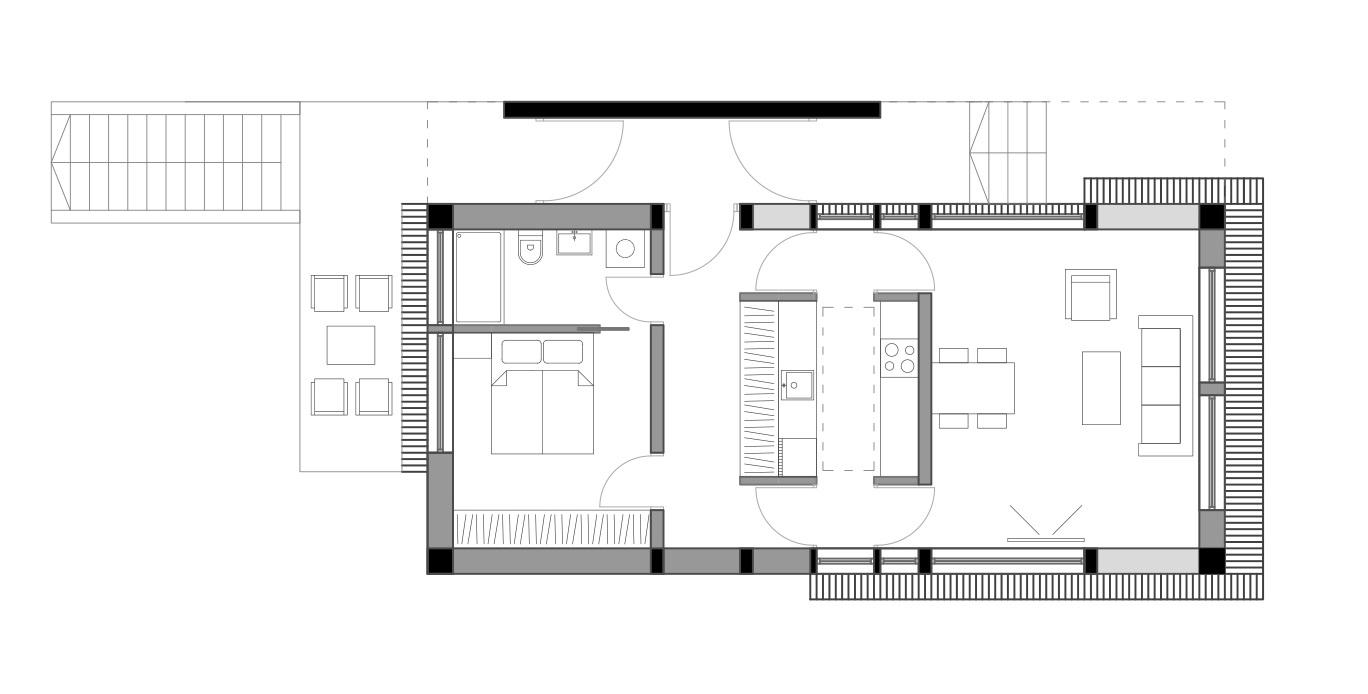
Krunoslav Šmit, Nataša Ivanišević, Katarina Kozlović, Ivan Matorić
Simultaneously, there were numerous donations of building materials, which alerted the architects. With respect for the good intentions and necessity of such noble gestures, there could be further uncontrolled and unprofessional repairs and construction, and thus possible further dangers.
"Due to all these perceived threats, as well as the general scope of tasks, we decided to get involved as an institution in various areas and levels of our activities - from professional to educational."
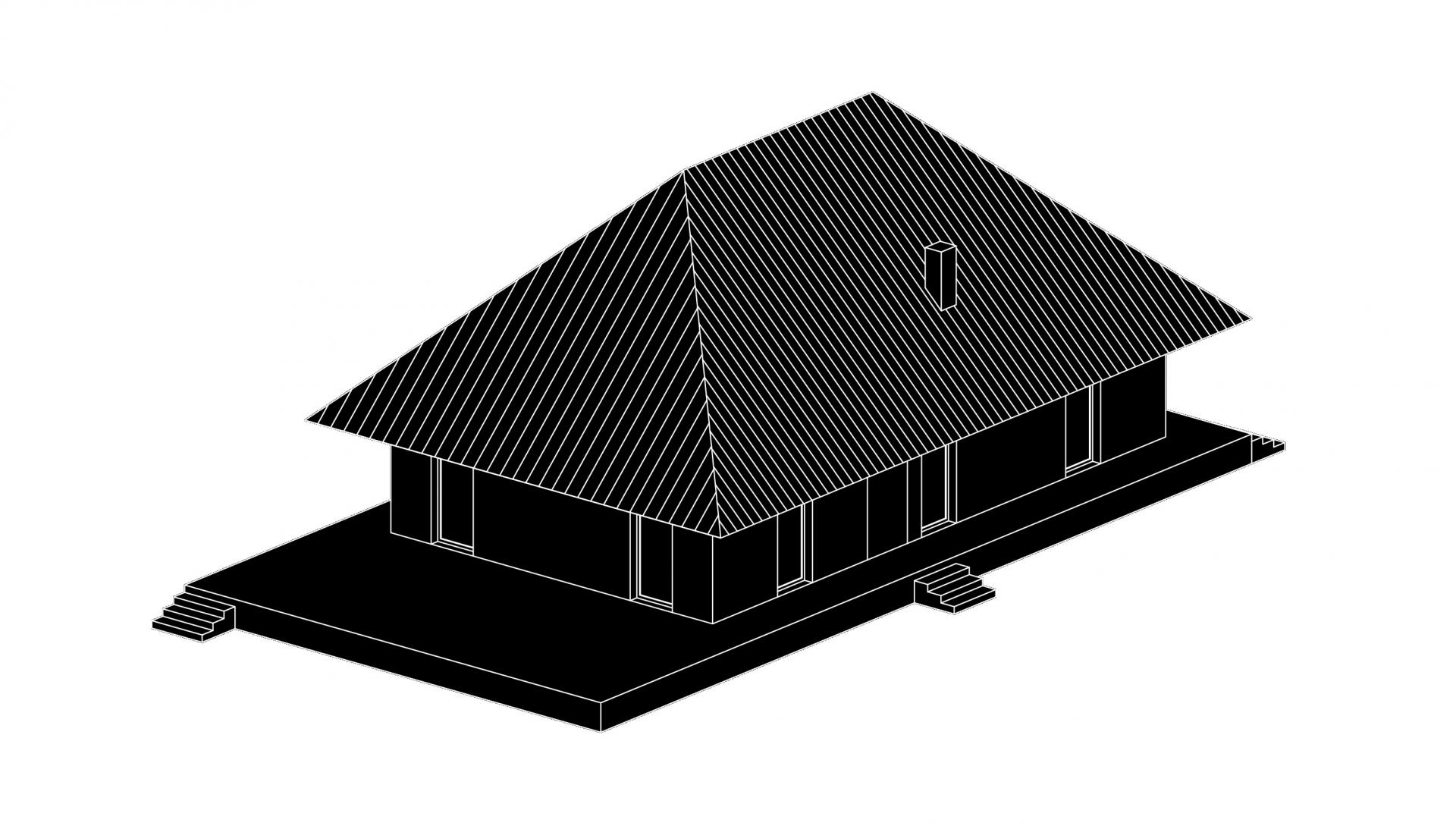
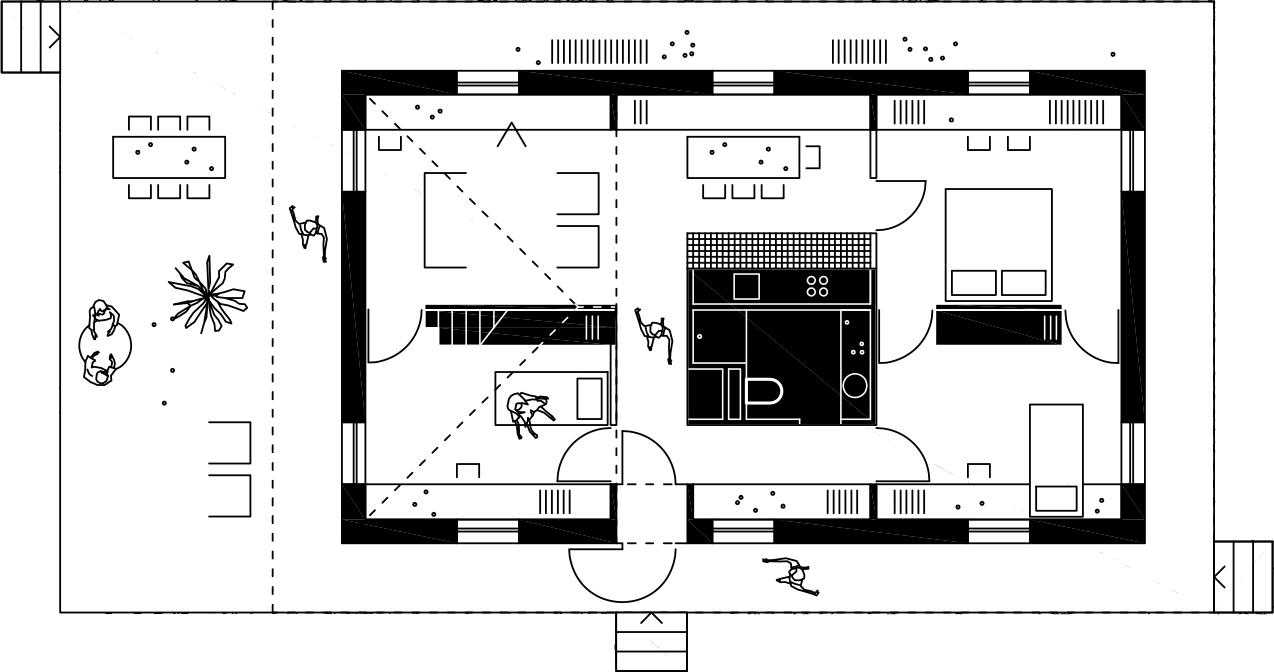
Ivana Ergic, Tamara Relic, Jana Horvat
Typical prefabricated house with a habitable roof - spatial view and floor plan
Ivana Ergić is a professor in the Cabinet for Residential Buildings of the Department of Architectural Design and young teachers, doctoral students Tamara Relić and Jana Horvat. Their solution - by interpreting the traditional pitched roof - leaves the possibility of expanding into it.
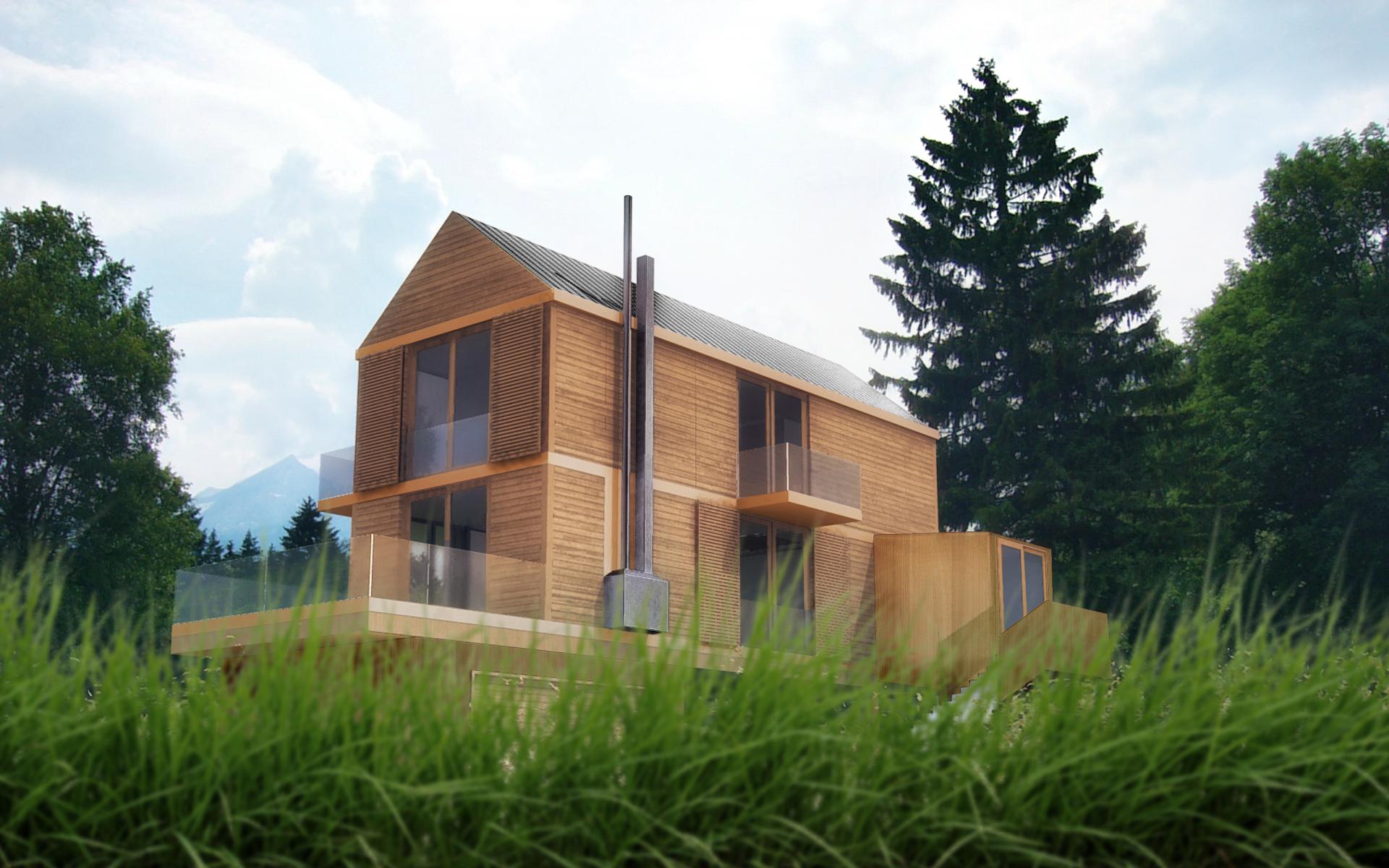
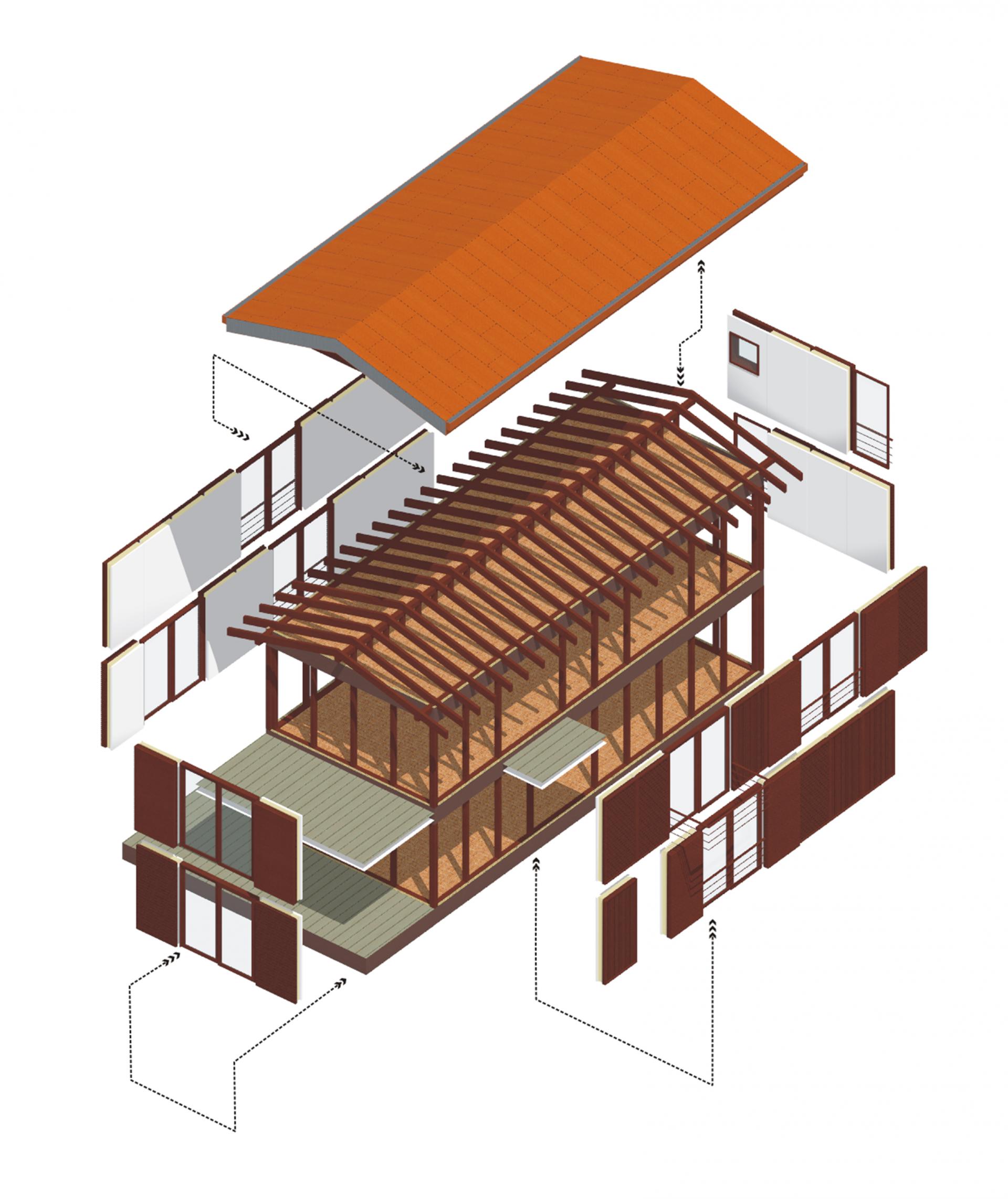
Ivica Plavec
Project of a typical modular house from the Klik-dom system - simulation and analytical presentation of building elements
Ivica Plavec is a professor at the Department of Architectural Structures and Building Physics. In his rich career, he especially dealt with modular construction in wood and developed a system called Klik-dom. In this system, he designed several houses that can be modularly increased in width and height.
"Through these projects of new, replacement buildings and houses and their backyards and farms, the tasks of organizing the space of damaged villages, restoration of collapsed urban tissues of historic cities, reconstruction of individual cultural monuments and valuable architectural heritage, and the necessary care to preserve the overall spatial and urban identity recognizable spatial and architectural spirit, we find responsibilities for our architectural and urban planning profession," concludes Šerman.
To read more about the Petrinja earthquake, follow TCN's dedicated page.
Simon Rožman No Longer Rijeka Coach After 0:1 Loss to Hajduk
February 28, 2021 - Coach Simon Rožman (37) resigned after Rijeka's defeat to Hajduk (0:1) at Rujevica in the 23rd round of the HNL on Saturday. The club's management accepted his resignation.
"Simon Rožman is no longer the coach of Rijeka. After the defeat to Hajduk, Rožman offered, and the HNK Rijeka management accepted his resignation, and the model of terminating his contract will be agreed upon. Rožman arrived in Rijeka at the end of September 2019, after which he won the Croatian Cup in 2020. This season placed in the Europa League group stage, where he achieved remarkable results in the competition against Napoli, Real Sociedad, and AZ Alkmaar. HNK Rijeka wishes Simon all the best in the continuation of his career," reads the club's statement, as reported by Index.hr.
The Slovene coach decided to leave Rijeka after another loss to Hajduk.
"We had two unforced substitutions due to injuries. When I pulled Čerin out, our midfield fell. Hajduk used that. Then we gave everything in the attack. We can't even score from the penalty spot. We need to gather our heads; we need to rest. We gave everything we have; we were 'all in.’ We had 15 shots on target," he said after the loss.
Rožman took over Rijeka in September 2019 when he succeeded Igor Bišćan, who went to the U-21 national team. In the first season on the Rijeka bench, he won the Cup, beating Lokomotiva 1:0 in the final.
He was in third place in the championship, and as the winner of the Cup, he qualified for the Europa League, in which he first defeated the Ukrainian club Colossus and then the strong Copenhagen. Rijeka was drawn into a terribly difficult Europa League group with Napoli, Alkmaar, and Real Sociedad and won a respectable four points.
Eleven days ago, Rožman signed a new contract with Rijeka until 2024.
"Thanks to the club once again for their support, it means a lot to the entire professional staff, and I believe that together we can achieve our goals in the future. The wish of all of us in Rijeka is to continue on the same path. At this moment, the situation may not look the best, We thank the club for thinking the same way, and we all want to develop content on the field together, promote young players to be sustainable, but do not forget the result ambition which is always to try to win a trophy and play in European competitions," said Rožman at the time.
To read more about sport in Croatia, follow TCN's dedicated page.
Zagreb Mayor Milan Bandić Dead, Heart Attack, Aged 65 Years Old
February 28, 2021 – Zagreb Mayor Milan Bandić has died. At the time of his death, he was the longest-serving capital city mayor in the world and was aged 65 years old.
Zagreb Mayor Milan Bandić has died. At the time of his death, he was the longest-serving capital city mayor in the world. And he was aged 65 years.
News of the death of Zagreb Mayor Milan Bandić was released by official city authorities early in the hours of Sunday 28 February 2021.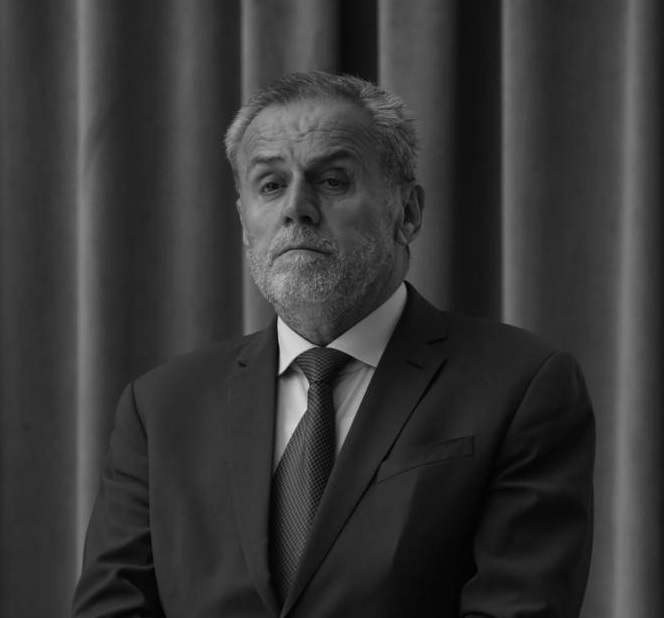 Zagreb Mayor Milan Bandić © Grad Zagreb
Zagreb Mayor Milan Bandić © Grad Zagreb
Death of Zagreb Mayor Milan Bandić: the city of Zagreb official statement:
“In deep sorrow, we inform our fellow citizens, associates, friends, the Zagreb and Croatian public that suddenly, today, February 28, at the age of 66, the Mayor of the City of Zagreb, Mr. Milan Bandić, died of a heart attack.
He lived for his city, for the people of Zagreb who were in the first place in everything he did, for the job he did with love and energy, bringing in his whole self - without the rest, for 21 years.
We will inform the public about the details, the date of the funeral, the holding of the commemorative gathering, as well as other information related to this sad news.
Rest in peace.”
Croatian media reports that Mr. Bandić fell ill shortly after 11.30pm on Saturday 27 February. It was initially reported that he was at home at the time of falling ill. However, it was later revealed that he had been attended by an ambulance and paramedics at an altogether different address, that of a friend. Shortly thereafter, an ambulance was called to his apartment on Bužanova ulica. Paramedics at the scene attempted to resuscitate Mr. Bandić for 45 minutes before taking him to Sveti Duh hospital, say the media. It would appear that efforts made to revive the mayor were sadly unsuccessful.
He served in the position for 21 years. At the time of his death, Zagreb Mayor Milan Bandić was the longest-serving capital city mayor in the world.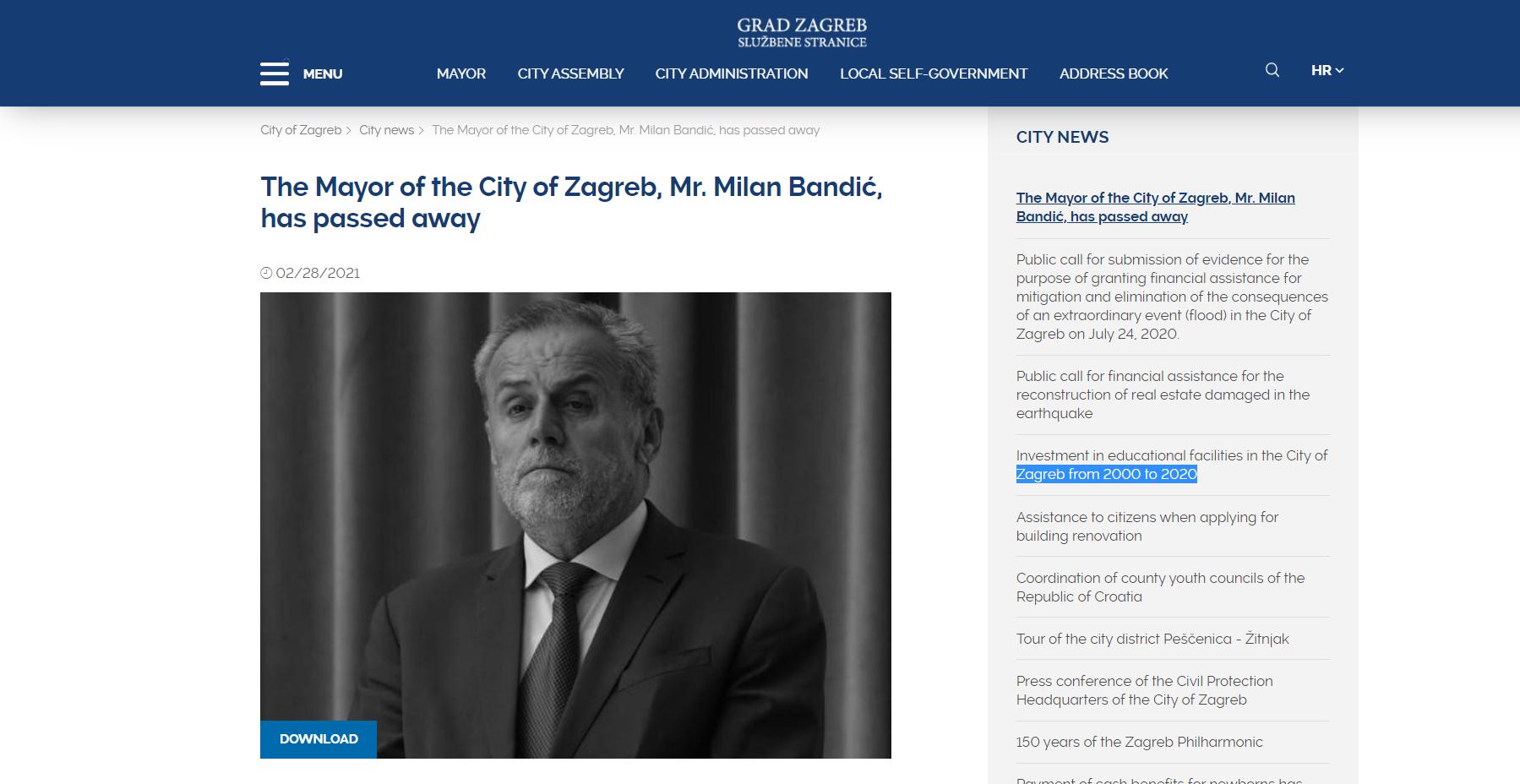 Grad Zagreb screenshot
Grad Zagreb screenshot
Mayor of Zagreb Milan Bandić: his life
Milan Bandić was born 22 November 1955 in the small hamlet of Bandića Brig, a part of Cerov Dolac in the municipality of Grude, Bosnia and Herzegovina. He excelled at athletics in his school years and after graduation, he received a scholarship from the municipality of Grude. This enabled him to go to Zagreb in 1974 to study at university. He enrolled at the Faculty of Political Science (and Journalism).
Over the course of many interviews he gave while in office, Mr. Bandić revealed that in his earliest positions he had worked as an unskilled labourer. However, he was gregarious and a good talker. He improved his employment status by entering local politics.
Following Croatia's independence, there was a change to the structure (and names) of the political entities to which politicians belonged. In 1993, Mr. Bandić became secretary of the SDP City Committee. In 1995, he entered the Zagreb City Assembly as a councilor. Two years later, in 1997, he became president of the Zagreb SDP. In 2000, after securing the largest share of votes, he started his first tenure in the position of mayor of Zagreb.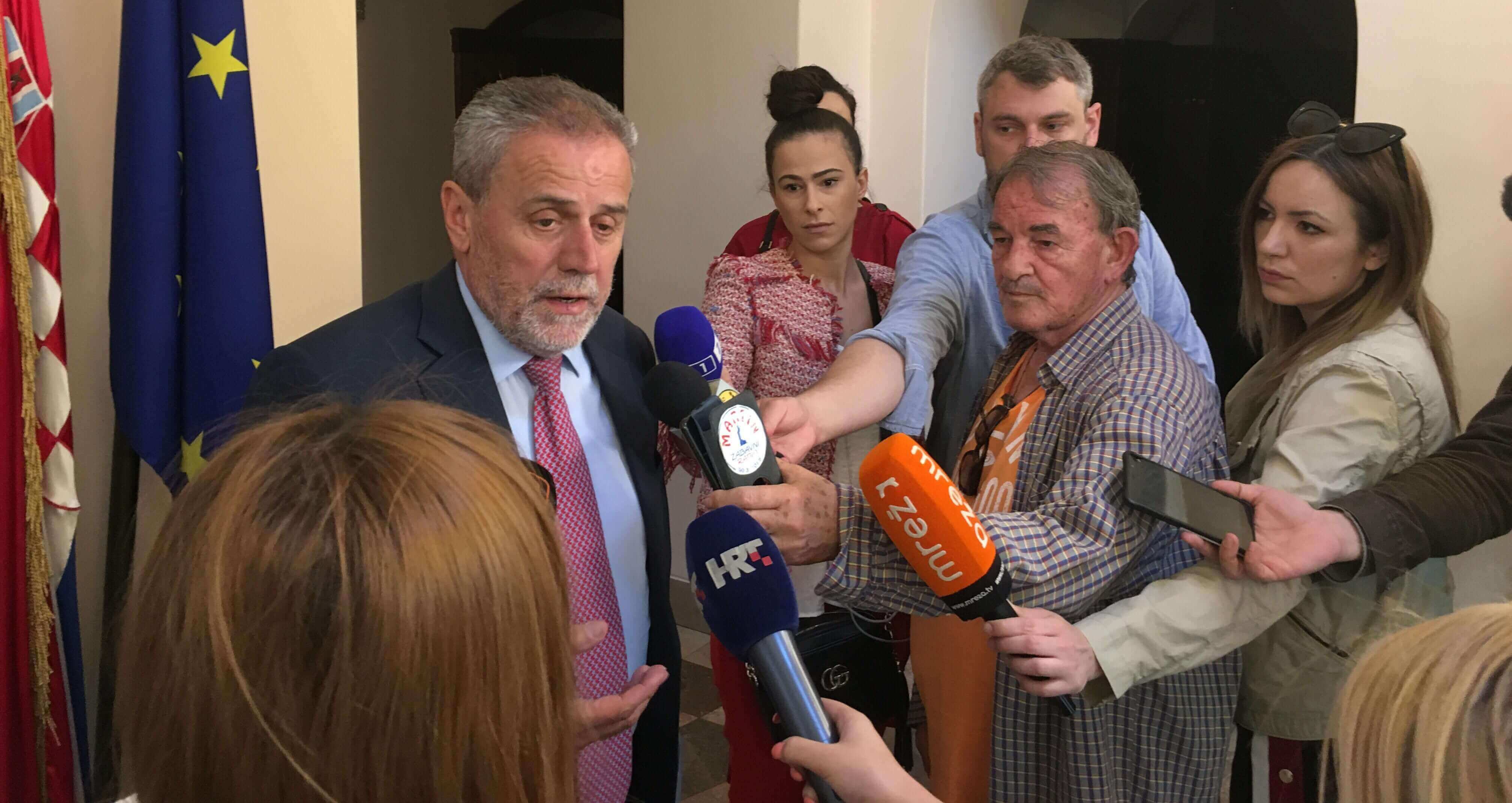 Grad Zagreb
Grad Zagreb
Milan Bandić: tenure as Mayor of Zagreb
As his years in the powerful position continued, Zagreb Mayor Milan Bandić attracted severe criticism from some quarters. He was linked to many scandals and Croatian media estimates that around 250 criminal charges were filed against him. He remained popular enough with segments of Zagreb's population to retain his position in a series of re-elections.
During his tenure as mayor, the city of Zagreb changed considerably. Several new suburbs were built. Housing was provided for a large number of the city's Roma residents. Transport within the city improved. Zagreb became an increasingly more tolerant and safer city. It also became more international.
People from all over the world came to visit the city and Zagreb became Croatia's most popular city destination for tourists (for instance, Zagreb Advent was initiated while Mr. Bandić was in office). Moreover, many internationals moved to live in Zagreb during his tenure, adding to the city's cosmopolitan feel. Many of Mr Bandić's detractors say that improvements in the city occurred in spite of him rather than because of him.
Death of Zagreb Mayor Milan Bandić: consequences
Zagreb mayoral elections are due to take place in 2021. The unexpected death of Mr. Bandić now holds considerable implications for their running and outcome. Many had expected Mr. Bandić to win yet another term. Sections of the Croatian media and political class had offered the opinion that, in some cases, weak candidates were being fielded by specific political parties in opposition to the mayor. Many regarded Mr. Bandić as untoppleable. Others still voiced their opinion that the fielding of weaker candidates was motivated by a desire to maintain the status quo and allow Mr. Bandić to pass without serious obstruction into another term. Such accusations were strenuously denied. As of 21 February 2021, some 12 persons had announced their candidacies for the forthcoming Zagreb mayoral elections. Whatever the outcome of these elections, this year's race will now be missing a candidate ever-present within them for the last two decades.
Mr. Bandic is survived by his wife Vesna who, famously, he married twice, and their daughter Ana Marija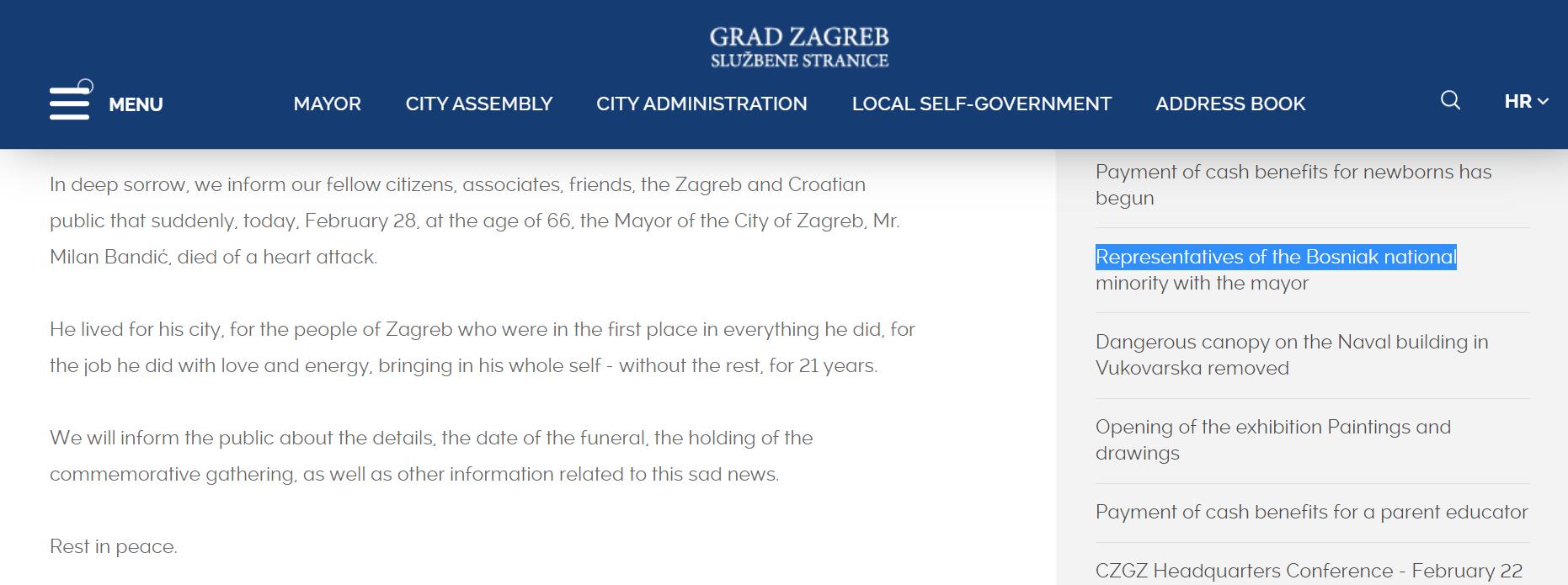 Grad Zagreb screenshot
Grad Zagreb screenshot
For the latest travel info, bookmark our main travel info article, which is updated daily.
Read the Croatian Travel Update in your language - now available in 24 languages.
Join the Total Croatia Travel INFO Viber community.
LEN Euro Cup: Mladost Tops CN Barcelona Away in Game 1 (11:9)
February 27, 2021 - Mladost tops CN Barcelona 11:9 in the first round of the LEN Euro Cup round of 16, played in Girona, Spain on Saturday afternoon.
The Mladost Zagreb water polo team won the first of two games against CN Barcelona in the LEN Euro Cup round of 16 on Saturday.
The match was very even, as expected. During the first two quarters, neither team had more than a one-goal lead. Mladost led the first quarter 2:1, while Barcelona won the second 3:1.
Mladost made the most of their chances, especially in the third and final quarter, when they achieved a small advantage, with two goals in the third to lead 7:5 and three in the last for 9:6.
The match ended at 11:9 for Mladost.
Konstantin Kharkov was the top scorer of the match with four goals.
The return match will be played in Zagreb on March 6.
To read more about sport in Croatia, follow TCN's dedicated page.
Phenomenal Filip Zubčić Wins the World Cup Giant Slalom in Bankso!
February 27, 2021 - Croatian skier Filip Zubčić wins the World Cup giant slalom in Bansko with a time of 2:20.62!
This is Zubčić's third World Cup victory in his career after Yuzawa and Santa Caterina. Frenchman Mathieu Faivre came in second place.
Zubčić was even better in the second run after an excellent first run in which he came second. In the end, the second-placed Faivre had a time of 2:21.02, while in third was Austrian Stefan Brennsteiner with a time of 2:21.55. Frenchman Alexis Pintaurault, who leads in the giant slalom skiers' standings and was only fourth in the overall standings, was more than a second behind Zubčić.
"It was an amazing race and amazing skiing. I am happy and proud of my team. I am really happy that this happened in Bansko because I love this ski resort and the people ", said Filip after the victory.
Only three more giant slaloms are left, and Zubčić is only 22 points behind the leading Pintaurault. Tomorrow is a new giant slalom in his favorite Bansko.
"I always fight for the best positions. Pinturault may have been slower today in the second run, but there are three more races ahead of us," said Zubčić.
In the ranking of skiers in the giant slalom, Zubčić jumped to second place with 468 points, and Pintaurault has 22 more. In third is Odermatt who was sixth today with 445 points.
In the overall ranking of skiers, Pintaurault leads with 974, in second is Odermatt, and in third is Austrian Marco Schwartz with 692 points. Zubčić advanced four places and is now sixth with 584 points.
Filip has his next race tomorrow, also in Bansko, where another giant slalom is being run.
RACE TIMES:
1. ZUBČIĆ Filip 2:20.62
2. FAIVRE Mathieu +0.40
3. BRENNSTEINER Stefan +0.93
4. PINTURAULT Alexis +1.06
5. ODERMATT Marco +1.52
6. FELLER Manuel +1.63
7. FAVROT Thibaut +1.77
8. MEILLARD Loic +1.82
To read more about sport in Croatia, follow TCN's dedicated page.
Iconic Split Riva Venue Brasserie on 7 Reopens with Exciting News!
February 27, 2021 - The iconic Split Riva venue Brasserie on 7 reopens with a new French/American Chef de Cuisine!
One of Split’s most attractive dining venues, Brasserie on 7 is reopening Monday, March 1st, for the 2021 season, with an exciting new chapter, by appointing French / American Alexandre Ange as Chef de Cuisine.
“After such a tough 2020 for the tourism and hospitality industry, I am thrilled to welcome Alex as our new Executive Chef. Sparked with passion for Mediterranean cuisine, we are absolutely delighted that Alex is joining our team, thus helping to further develop our culinary story! “ – says with excitement Maria Mustapic, one of the two owners of Brasserie on 7.
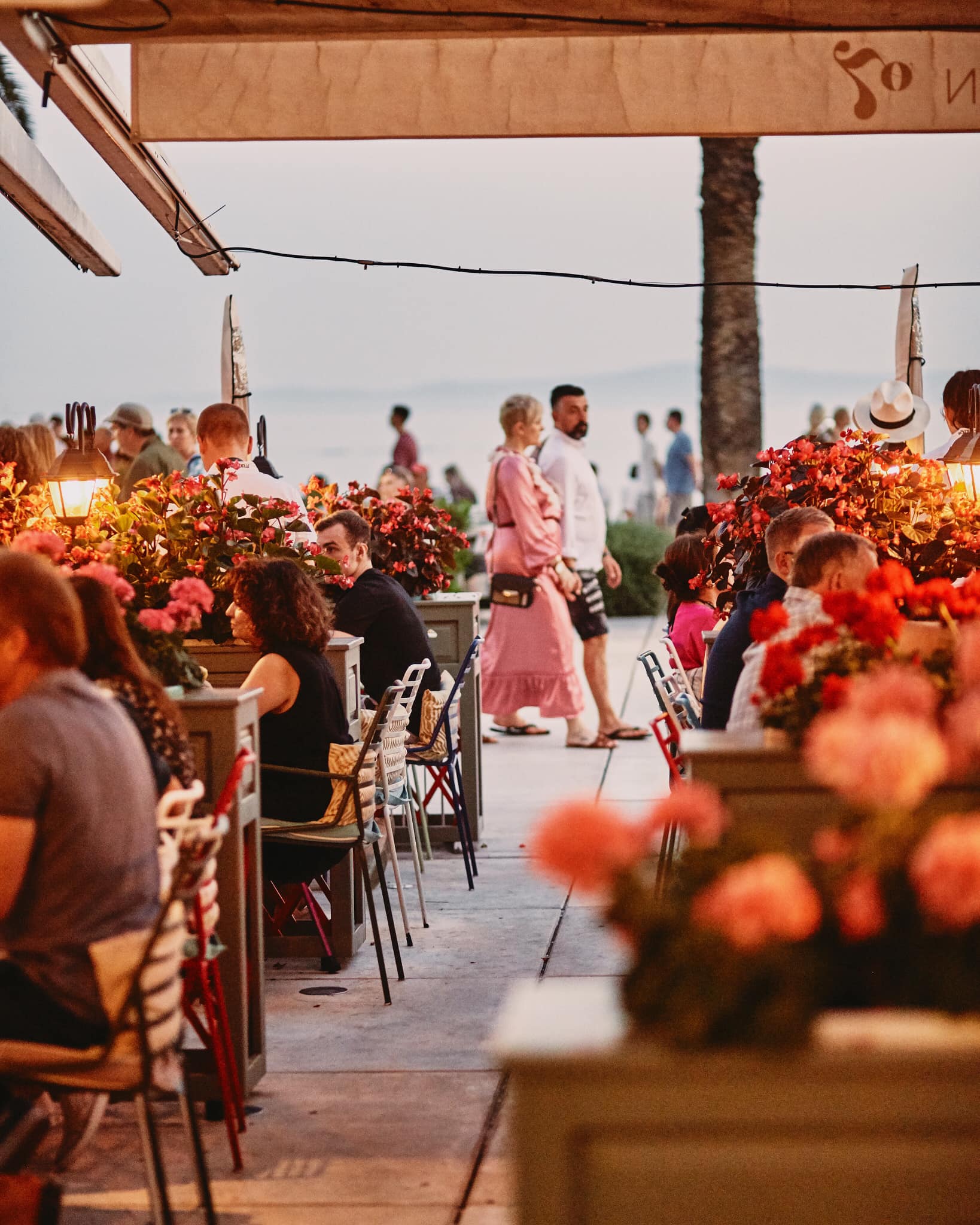
Classically trained in French cuisine, Alex has spent the past 12 years working in some of the top restaurants in France & the United States, including the famous L’Atelier in Paris, run by Chef Joel Robuchon (the chef with the most Michelin stars in the world). Alex made the move to Split, together with his family, with an exciting vision on how to expand and improve on the imaginative and inventive À la carte menu that B7 is already famous for:
“I strongly believe in using local ingredients and supporting Dalmatian producers. My vision is to bring our guests an exceptional and memorable dining experience by introducing a renovative food menu that satisfies the taste bud of local and international guests”, pledges Ange.
This spring, the new B7 Executive Chef will be introducing subtle changes across the menu, while using the very best produce Croatia has to offer.
“Delicious exciting changes are coming to our breakfast, lunch and dinner menus - including vegetarian and vegan dishes, but we will let you discover them when you visit us at Brasserie on 7 in Split this season, we are very eager to reopen on March 1st” invitingly says front of house Ivan Rabadan.
For the last seven years, Brasserie on 7 has become known for its world class breakfast in an iconic Riva setting, a casual upscale café vibe for lunch and a refined coastal French inspired Adriatic dinner to both tourists and locals alike.
„Our goal, as always, is to provide a memorable dining experience for each and every one of our guests. And with the addition of Alex I am confident that Brasserie will reach new heights“, says Korana Bucic, the other half of the power duo behind B7' success.
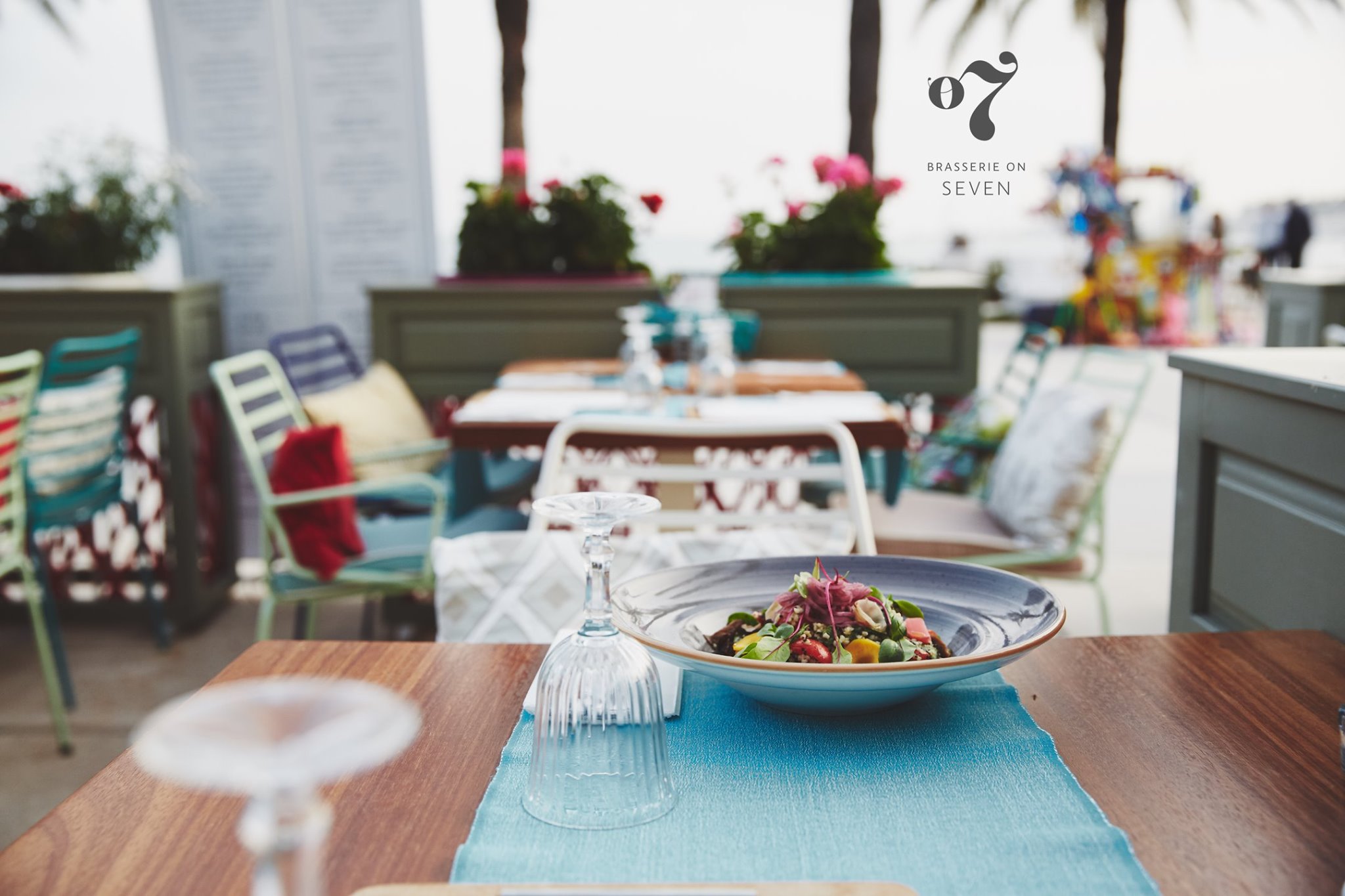
Born and raised in Australia, childhood friends Maria Mustapic and Korana Bucic returned to Croatia in 2006 and made waves when they opened the first registered hostel in Split. Then they just kept going, opening a second hostel, Charlie's backpackers bar, Zinfandel food & wine bar and – in March 2014 – adding Brasserie on 7 as the crown-jewel of their business portfolio.
ABOUT CHEF ALEXANDRE ANGE
Classically trained in French cuisine, Alex Ange has spent the past 12 years working in some of the top restaurants in France and the United States.
His career started in New York City, working as a stagiaire in various restaurants as a summer job during high school. After graduating, he decided to pursue cooking as a profession, and returned to France to begin a professional culinary apprenticeship under chef Joel Robuchon (the chef with the most Michelin stars in the world) at his restaurant L’Atelier in Paris.
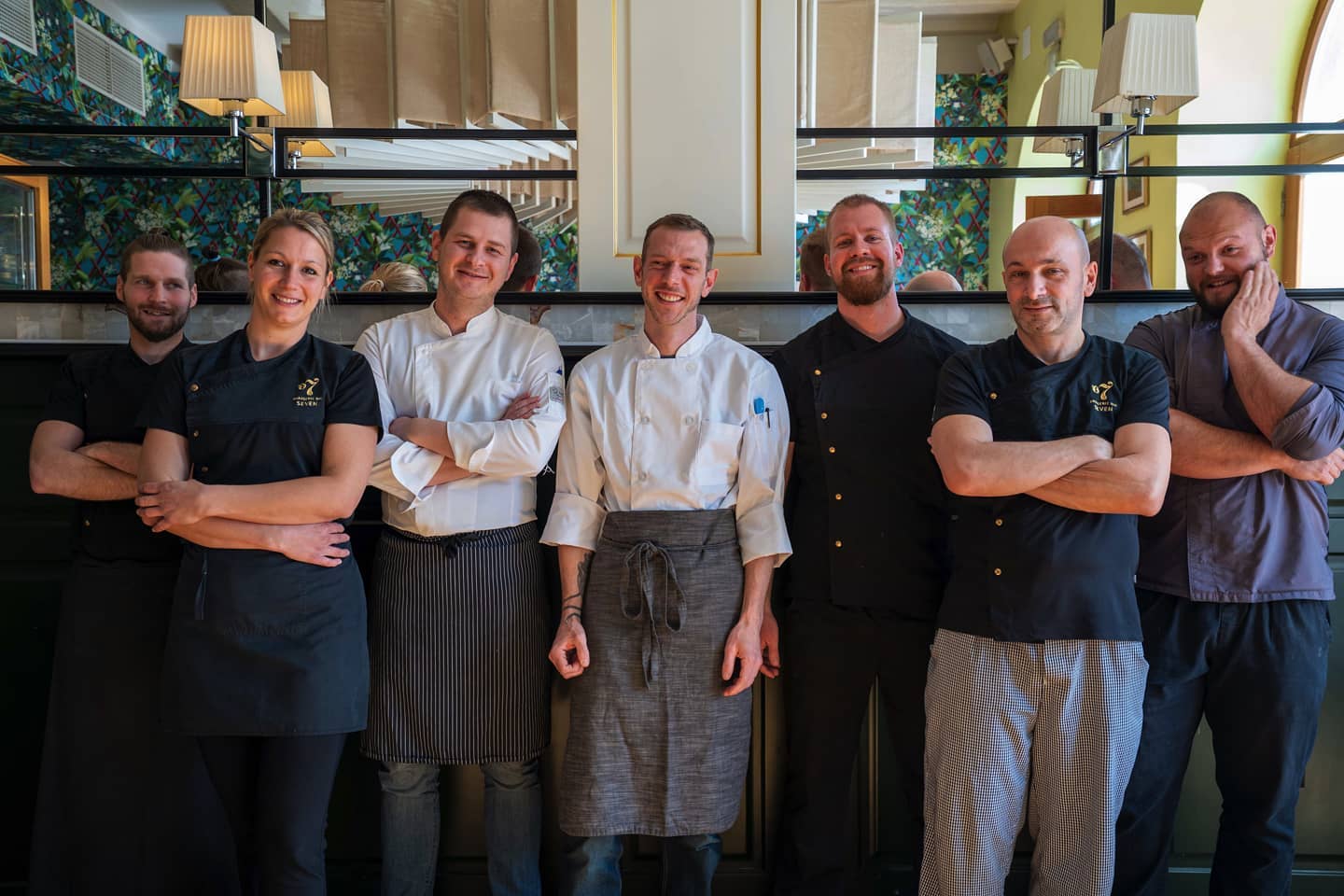
This opened many doors and enabled him the opportunity to work with some of world’s best chefs, including Thomas Keller and Philippe Tessier at The French Laundry in California’s Napa Valley, Joshua Skenes at Saison in San Francisco, Daniel Boulud at Restaurant Daniel in New York, as well as Marcus Samuelsson.
ABOUT BRASSERIE ON 7
Owned by business power-duo Korana Bucic & Maria Mustapic, Brasserie on 7 is located on the most sought-after location in Split, on the stunning Riva, overlooking the Adriatic Sea.
Since it opened, in March 2014, B7 has been run under the competency of Ivan Rabadan as front of house.
The operation is reinforced by quality with multi award winning barista Matea Vuletic, and an inhouse pastry and bakery team run by the talented Ivana Bradaric since 2015. Known for its sweet Tuesdays on the Riva.
B7 staff has been constantly improving on their skills, by enrolling in work experiences in Zagreb, Marseille, London, as well as many culinary and Food&Beverages workshops and courses. The team won Gourmet Expo in 2019.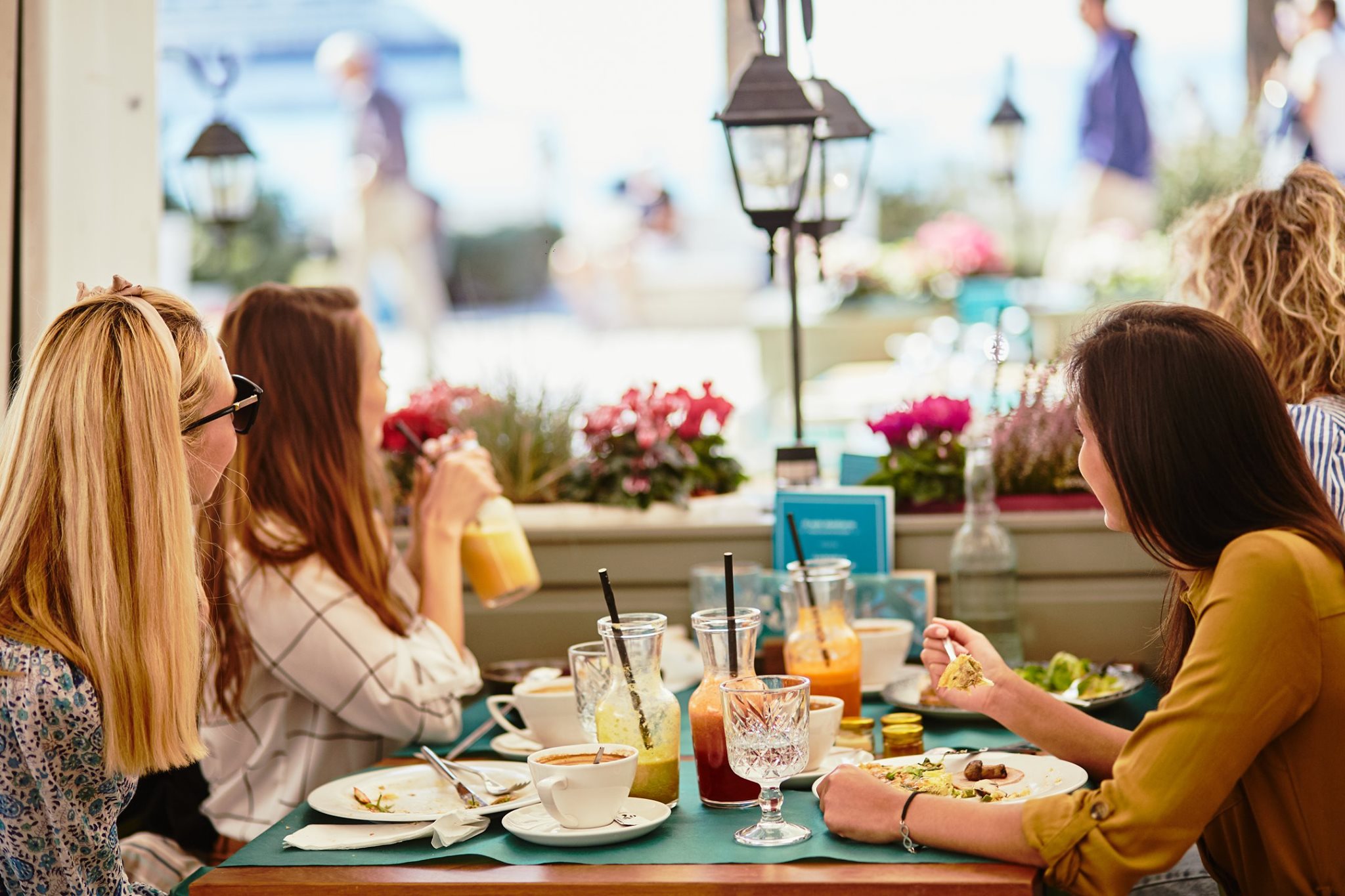
Brasserie on 7 takes pride in being part of the community and contributing whenever they can, including the humanitarian fundraising of up to 90,000kn for the children’s ward in Split. In the recent crisis of COVID, both B7 and Zinfandel restaurants took part in cooking for the medical staff and most recently their chefs showed homage to the citizens of Petrinje, affected by the recent devastating earthquakes, by joining the 300 volunteer chefs that cooked for them.
To read more about lifestyle in Croatia, follow TCN's dedicated page.
Croatian National Tourist Board Director: As Many As Possible Should Be Vaccinated by Tourist Season
February 27, 2021 – Croatian National Tourist Board director Kristjan Staničić stated in a recent interview for Glas Istre that we must continue to be very disciplined with measures, and by the beginning of the tourist season, we should vaccinate as many people as possible.
After months of Europe in lockdown and uncertainty that lasted throughout the winter, the start of mass vaccination has restored some optimism that the pandemic will soon be defeated. With optimism, thinking about the little things that enrich life like travel and vacations came back too.
The beginning of February brought the first significant wave of reservations for tourist accommodation in Istria, mostly guests from the German market. In the region where most of the revenue comes from this activity, all news about plans and announcements for next summer are eagerly awaited.
Glas Istre's journalists talked to the Croatian National Tourist Board (CNTB) director Kristjan Staničić about this topic and the expectations for the upcoming season. Announcing a series of promotional activities of the CNTB in the essential markets, Staničić confirms that this recently reawakened optimism for a solid tourist season is definitely not without grounds.
"We are in constant and direct contact with the markets through our representative offices and partners. According to the information we have, interest in travel exists, and with the intensification of vaccination throughout Europe, it is growing even more. The result is certain accommodation reservations for the upcoming season, which have also intensified recently. However, these figures are, of course, much lower than in previous, so to speak, 'normal' years.
Given the current situation, it is to be expected that the tourist season will begin in late May or early June. This means that, given the situation and the epidemic that prevails in all European countries, we have moved a little towards the summer months. But one should be optimistic, and two messages should be sent to the public.
The first is that we must continue to be very disciplined in implementing all measures because this is effective and results in a decline in the number of infected people. This means that it is mainly up to us what kind of picture we will have and how we will enter the season.
The second message is related to the importance of vaccination against COVID-19 and the tendency to vaccinate as many people as possible by the beginning of the tourist season because then it will mean that the pandemic will come within some reasonable framework that allows us to start tourist traffic," said Staničić.
What can individual tourist regions expect from the upcoming season, and how will they be promoted?
When we look at the regions, it is certain that Istria and Kvarner, but also the northern tourist regions, have a particular advantage because they are closer to key markets such as neighboring Italy, Slovenia, Hungary, but also a slightly wider environment of Austria, Germany, Slovakia, and the Czech Republic. But, of course, we also carry out activities in other markets. It is extremely important for us how we will rehabilitate our southern regions, primarily the Split or Dubrovnik area, which is dependent on air traffic.
Therefore, we are active in, for example, the market of Great Britain, Scandinavia, but also other markets. However, our great advantage over the competition is the proximity of the main markets, i.e., the fact that we are primarily a car destination and 83 percent of tourists come to Croatia by car. In that sense, we will conduct the most important marketing campaigns that will start, depending on the situation, sometime in the spring.
What needs to be emphasized is that we will primarily run marketing campaigns in 11 markets and that each campaign will be tailored to each country's specifics.
When we talk about promotion in a pandemic, many classic channels have fallen into the background. How does tourism promotion actually work in the conditions of the "new normal"?
Of course, the coronavirus has accelerated certain processes, primarily in the direction of digitalization. Last year and the year before, we started promoting it more intensively through digital communication channels, which proved to be very effective. We have been present in the digital space all along. From the last tourist season until today, we have implemented several marketing campaigns on digital communication channels and social networks.
I will only mention the last one, which we started earlier this year. The campaign's name was "Croatia full of new beginnings," and over 30 million people have seen it in the past month and a half. We have many impressions, and more than two million people even went a step further and were interested in specific reservations. So digital communication channels are certainly one of the most important tools we use in this period in the promotion and so it will be in the future.
As for tourism fairs which are also an important form of promotion in certain markets, the most important of them have also been held this year or will be held online like the London and Berlin fairs. We are, of course, present at them with specific presentations and use the opportunity to meet domestic and foreign stakeholders in tourism through virtual platforms.
On this occasion, I would also like to commend our Brand and Production Department within the CNTB, which designed a unique platform and went in the direction of enabling b2b workshops and virtual meetings that we organize in cooperation with our offices, which proved to be very good.
How do you choose the tourist market segments that you are targeting with promotional actions, especially before this season?
The CNTB always plans its promotional activities based on very relevant indicators, analyzes, and market trends. Given the coronavirus pandemic circumstances, we have focused on promoting those products in this segment and, in that sense, the most sought after. Staying outdoors, staying in separate facilities, and even nautical tourism were segments that were very pronounced last year.
Likewise, we have focused on specific products that are attractive to certain niche markets and tourist groups. Digital nomads, for example, are just one such group, but we have such an approach in other campaigns as well, and it has proven to be correct given the effectiveness of the campaigns themselves.
At the end of last year, we also measured our strength of the tourist brand and received the information that in the previous period, despite the coronavirus, we have grown in its recognizability. Two elements came to the fore, namely our natural beauty and attractiveness, and security and proximity to the market, which last year proved to be one of the key elements that made Croatia the number one destination in the Mediterranean.
For the latest travel info, bookmark our main travel info article, which is updated daily.
Read the Croatian Travel Update in your language - now available in 24 languages.


